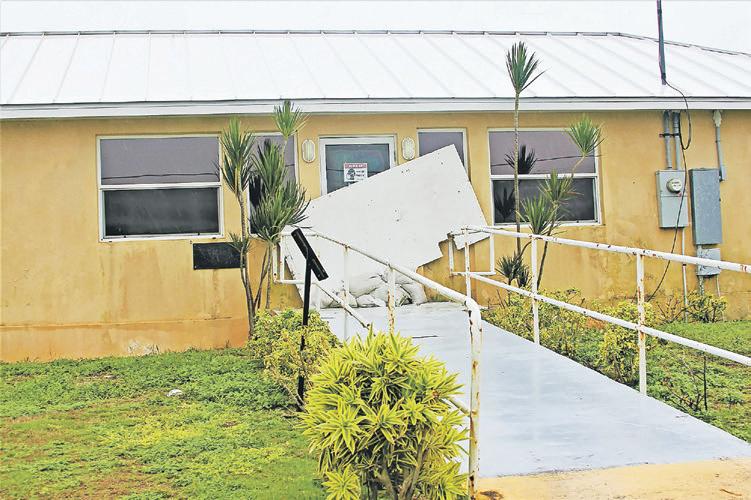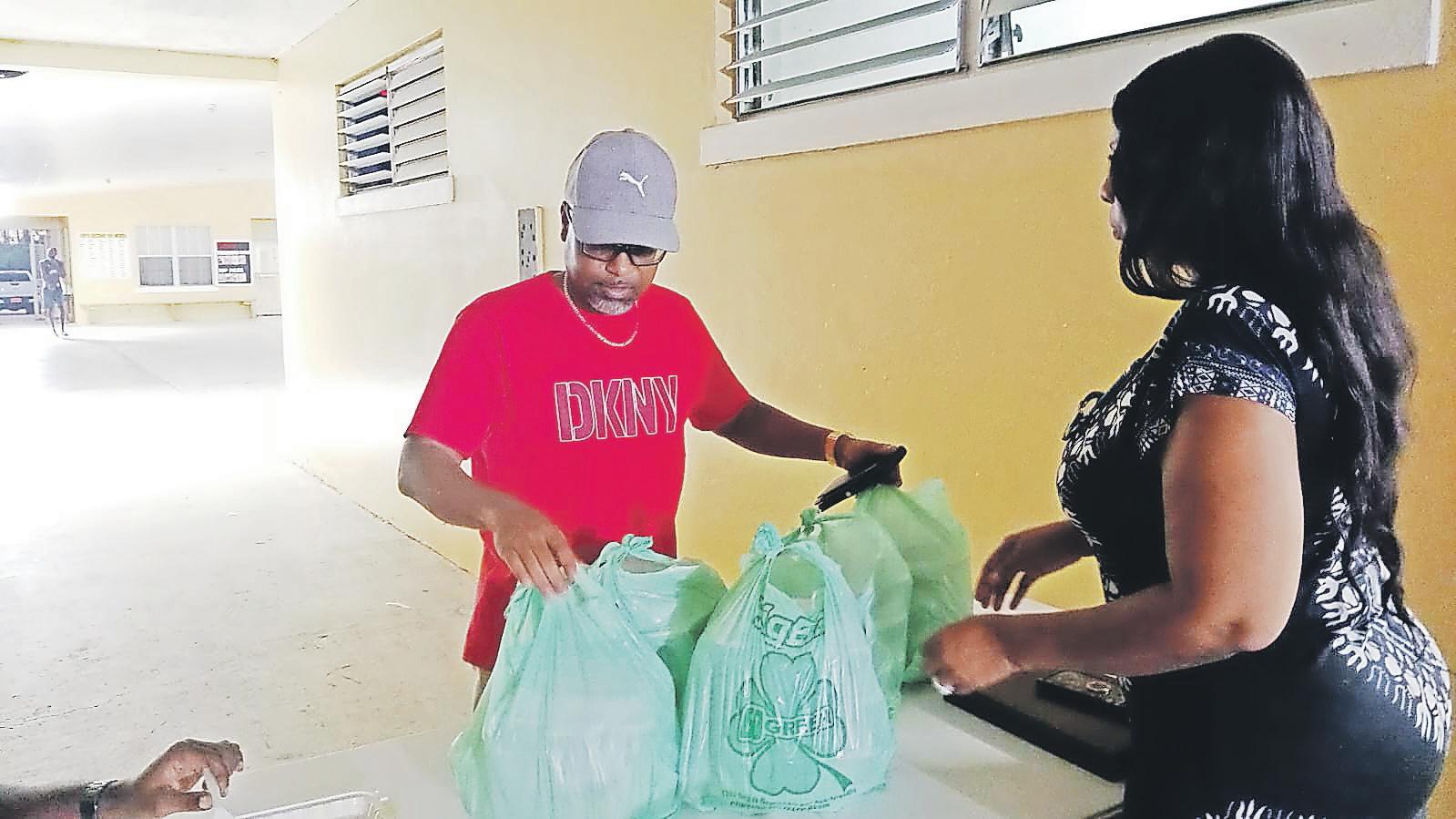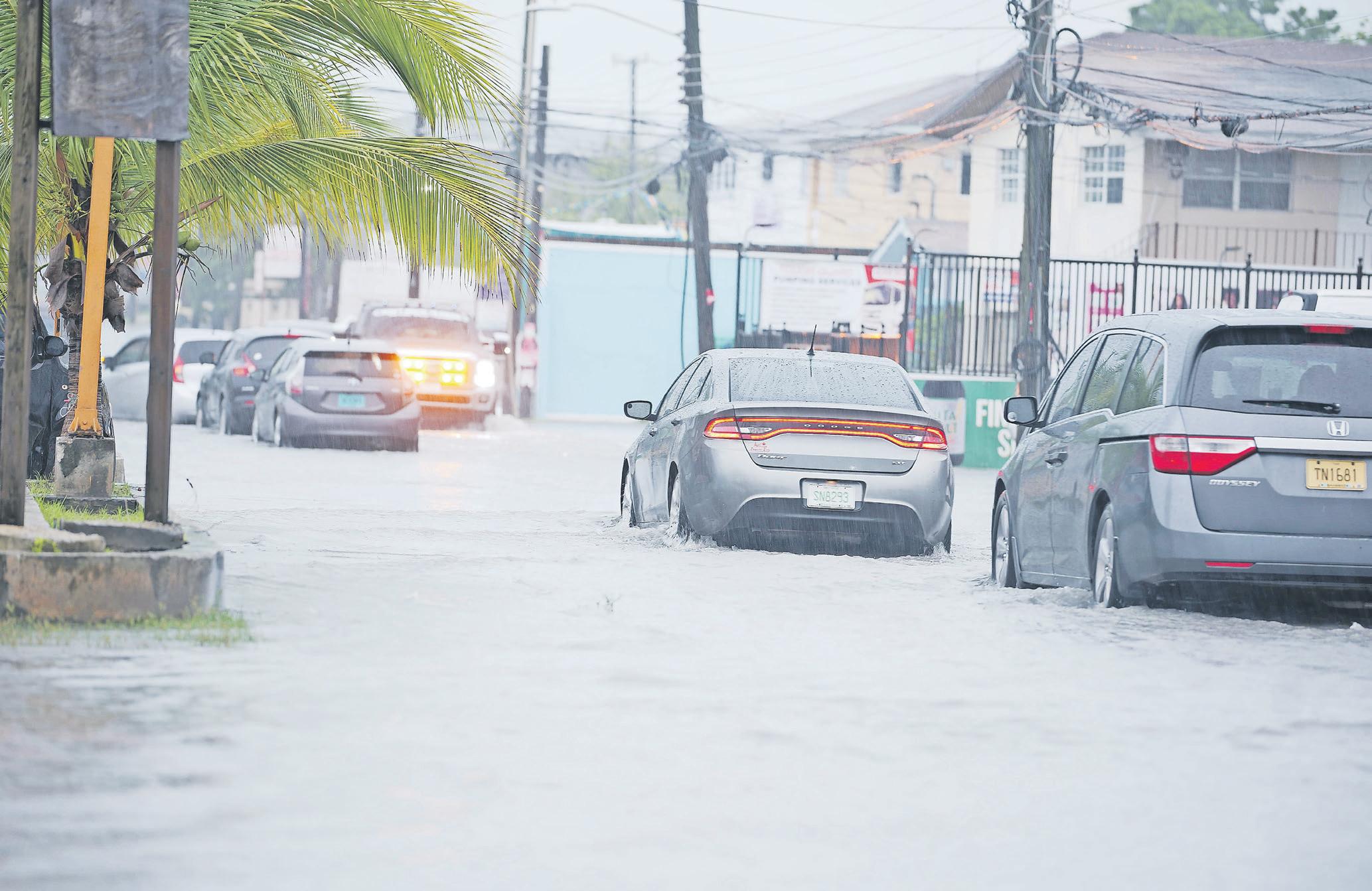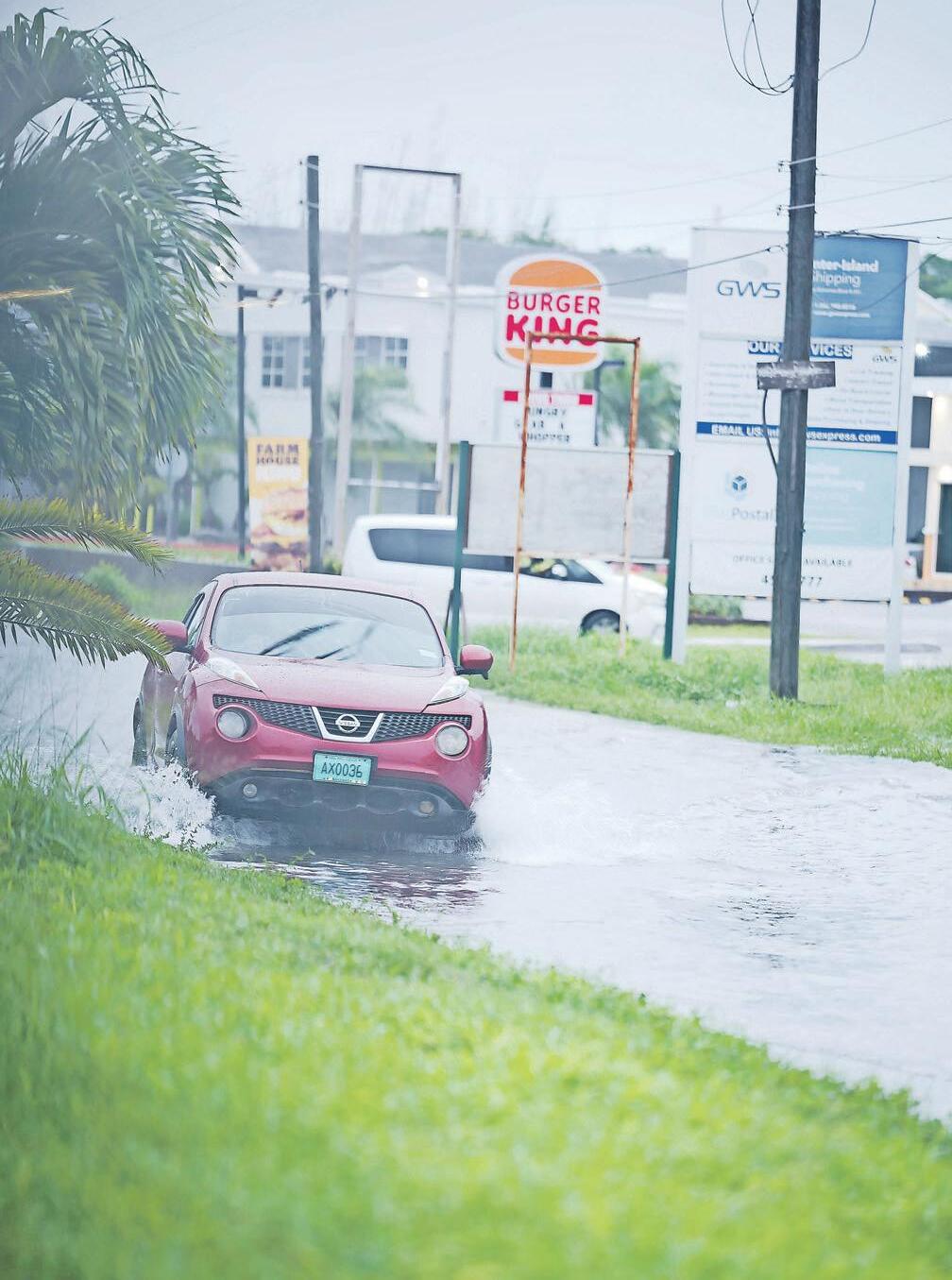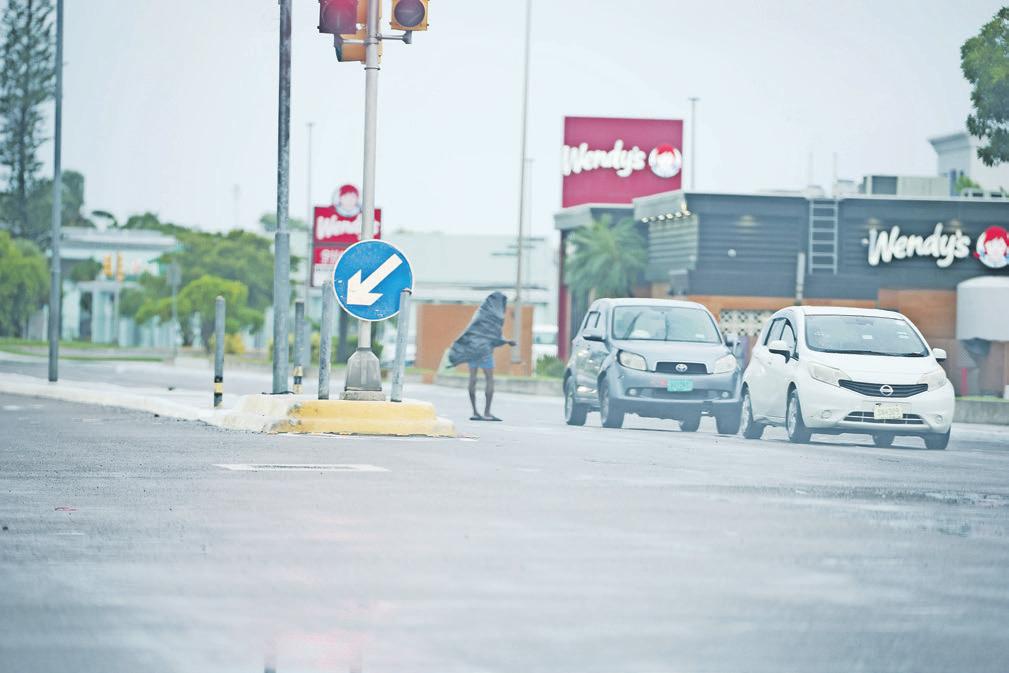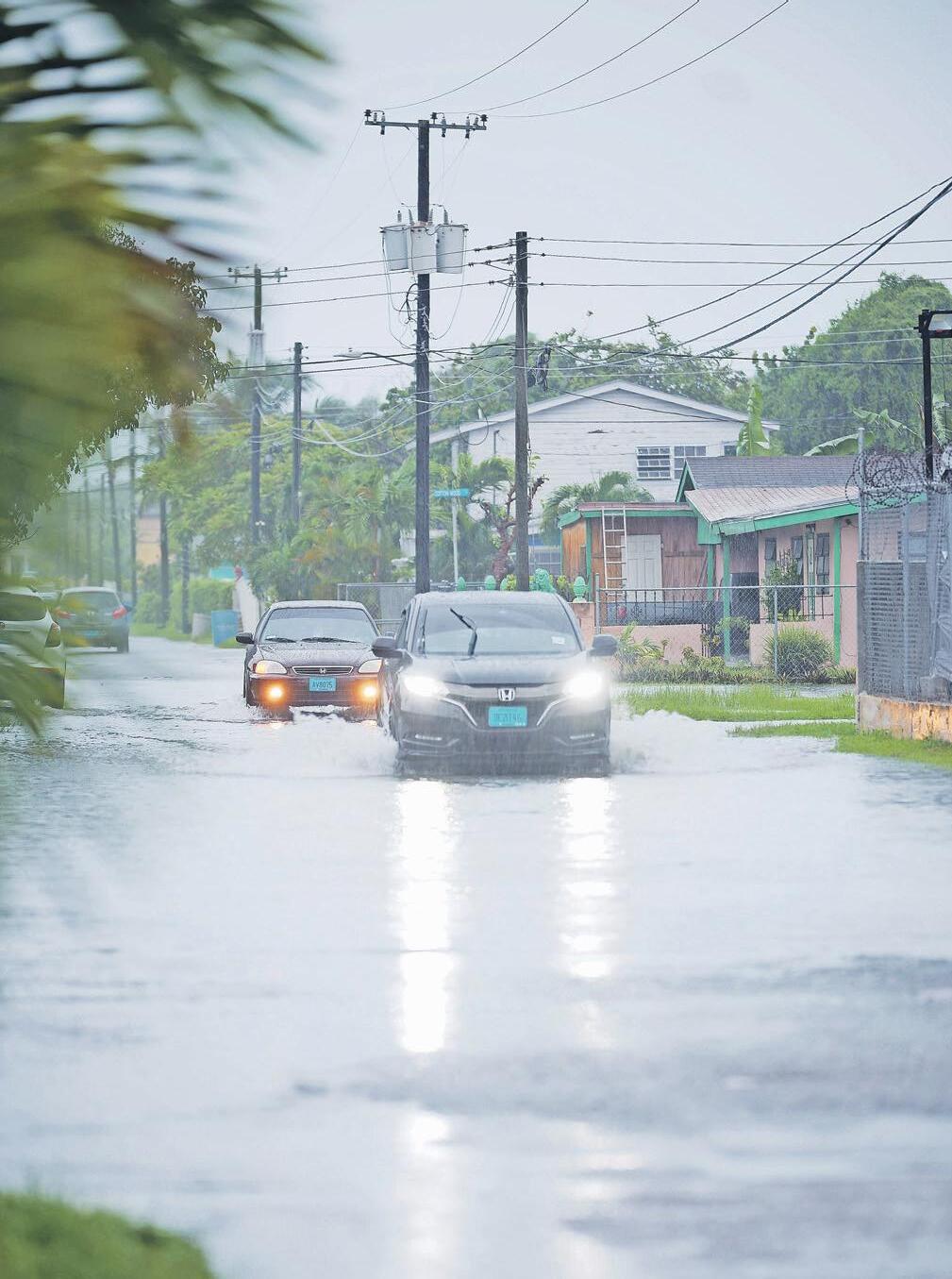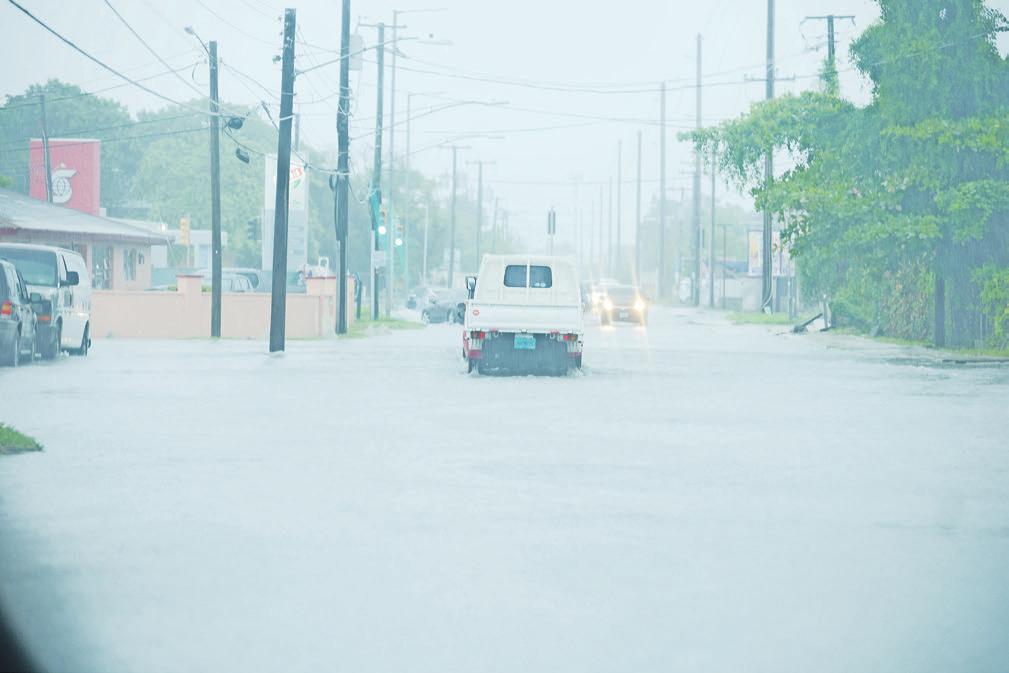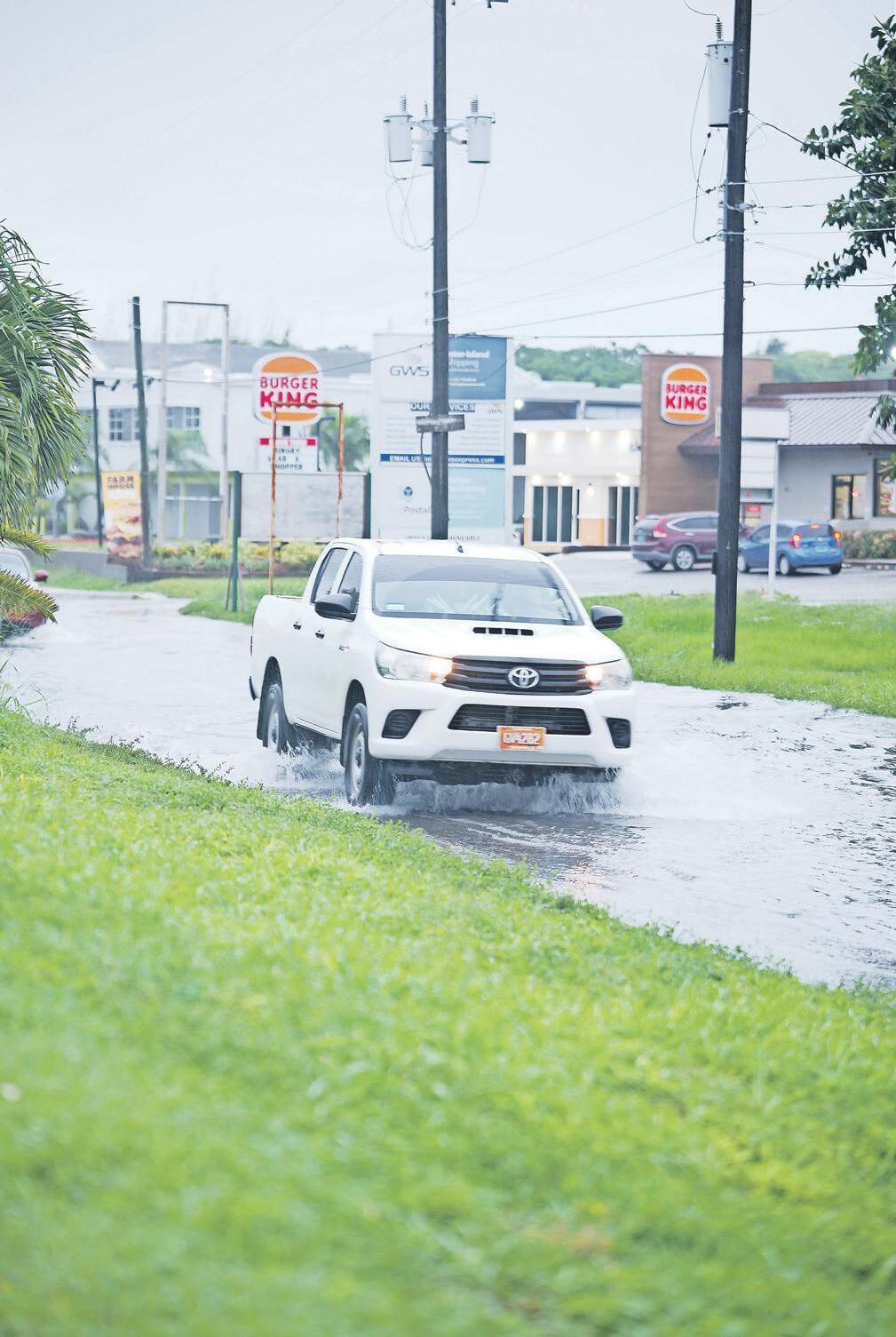







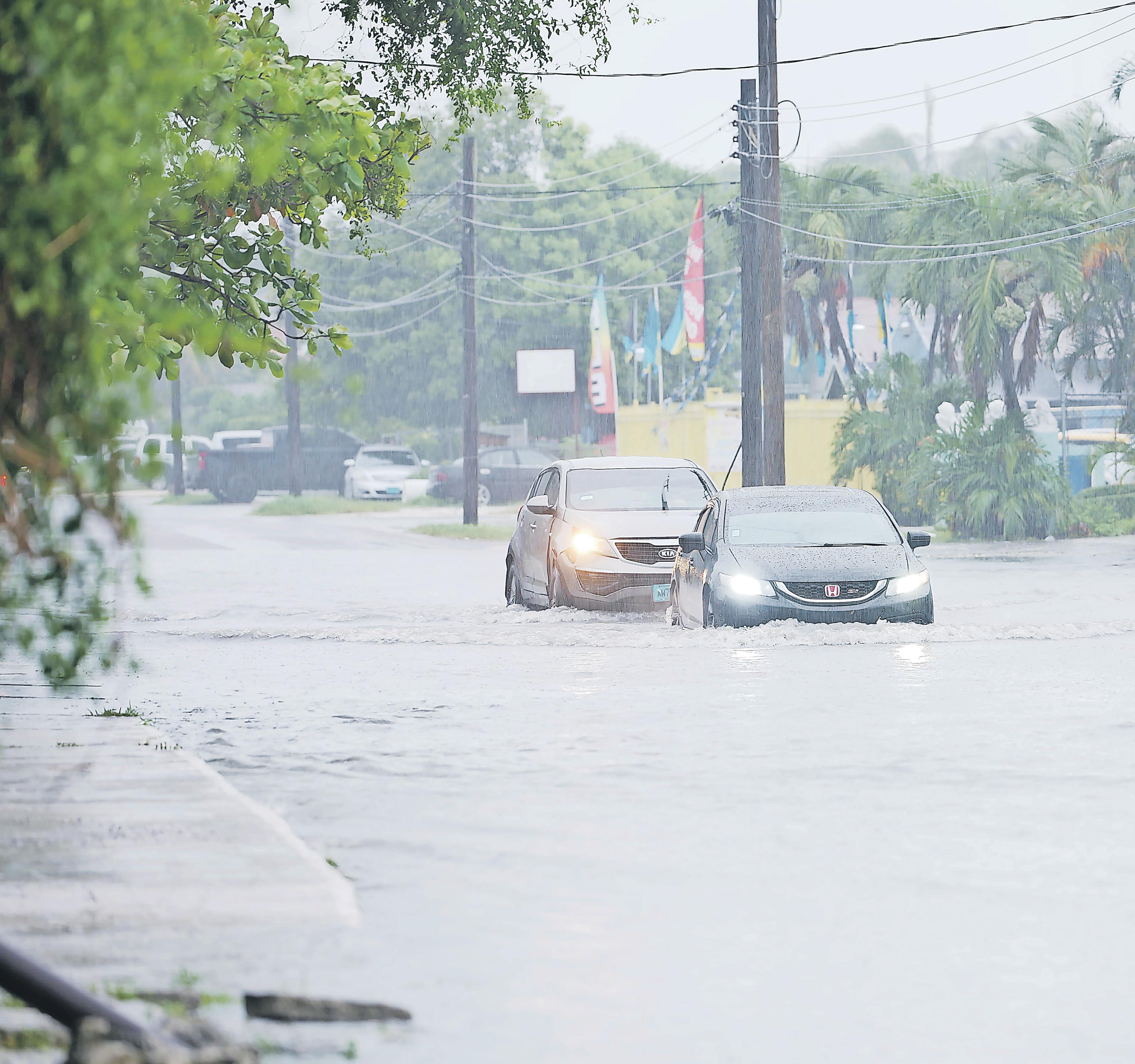

By EARYEL BOWLEG
THE country was stunned yesterday by the sudden death of Environment and Natural Resources Minister Vaughn Miller, 64, who collapsed without warning in the early hours of the morning, becoming the second sitting Cabinet minister to die during the Davis administration.
Police said Mr Miller, the MP for Golden Isles,
collapsed on Hawkins Hill around 1am. CPR was administered before he was taken by private vehicle to Doctors Hospital, where he was pronounced dead. No foul play is suspected. An autopsy will be performed to determine the cause of death.

Cabinet colleagues rushed to the hospital in the early hours as news spread. Condolences poured in from across the political MILLER - SEE PAGE FIVE MINISTER for the Environment and Natural Resources Vaughn Miller speaks to the media on March 27, 2024.
THE Bahamas is being urged not to

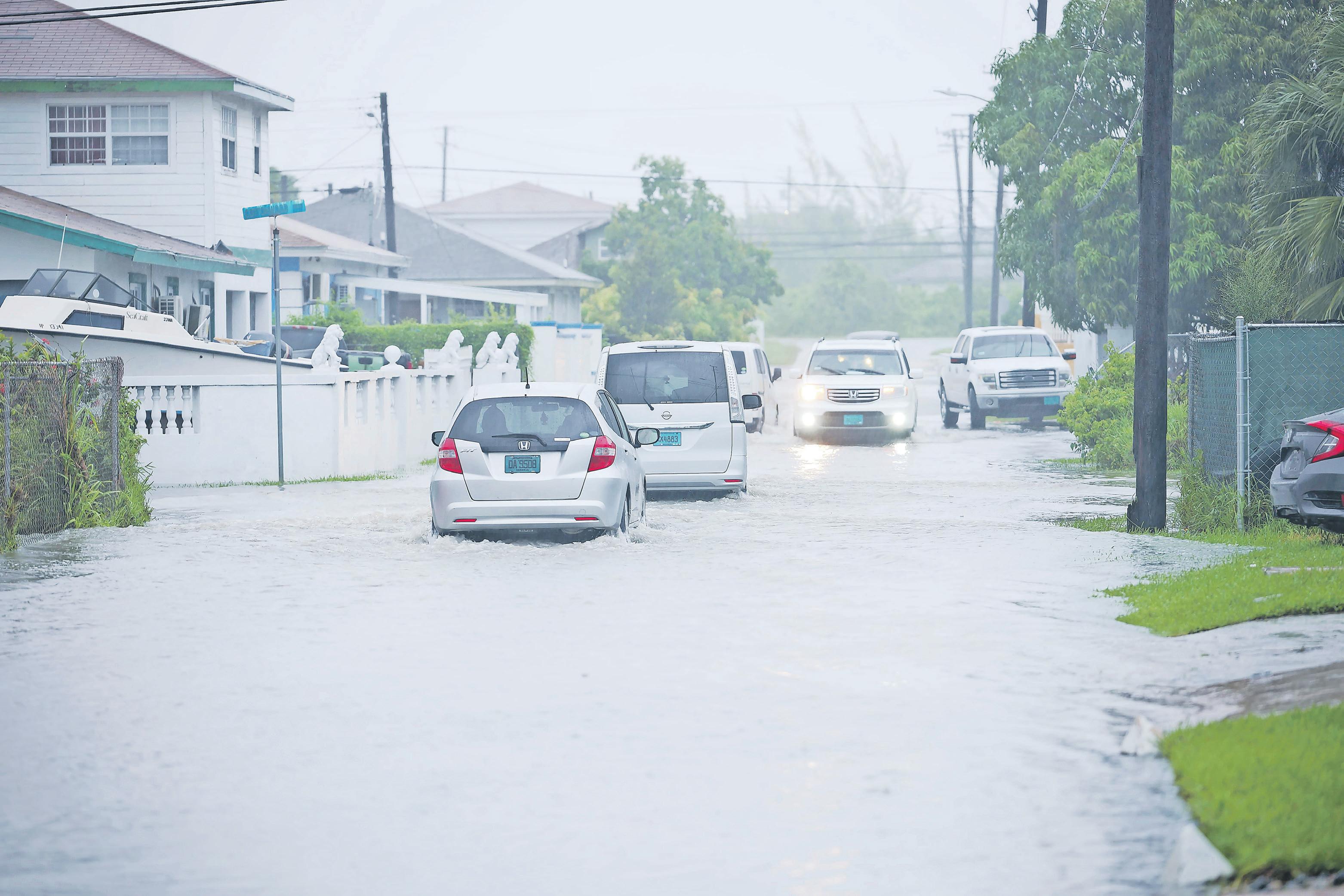
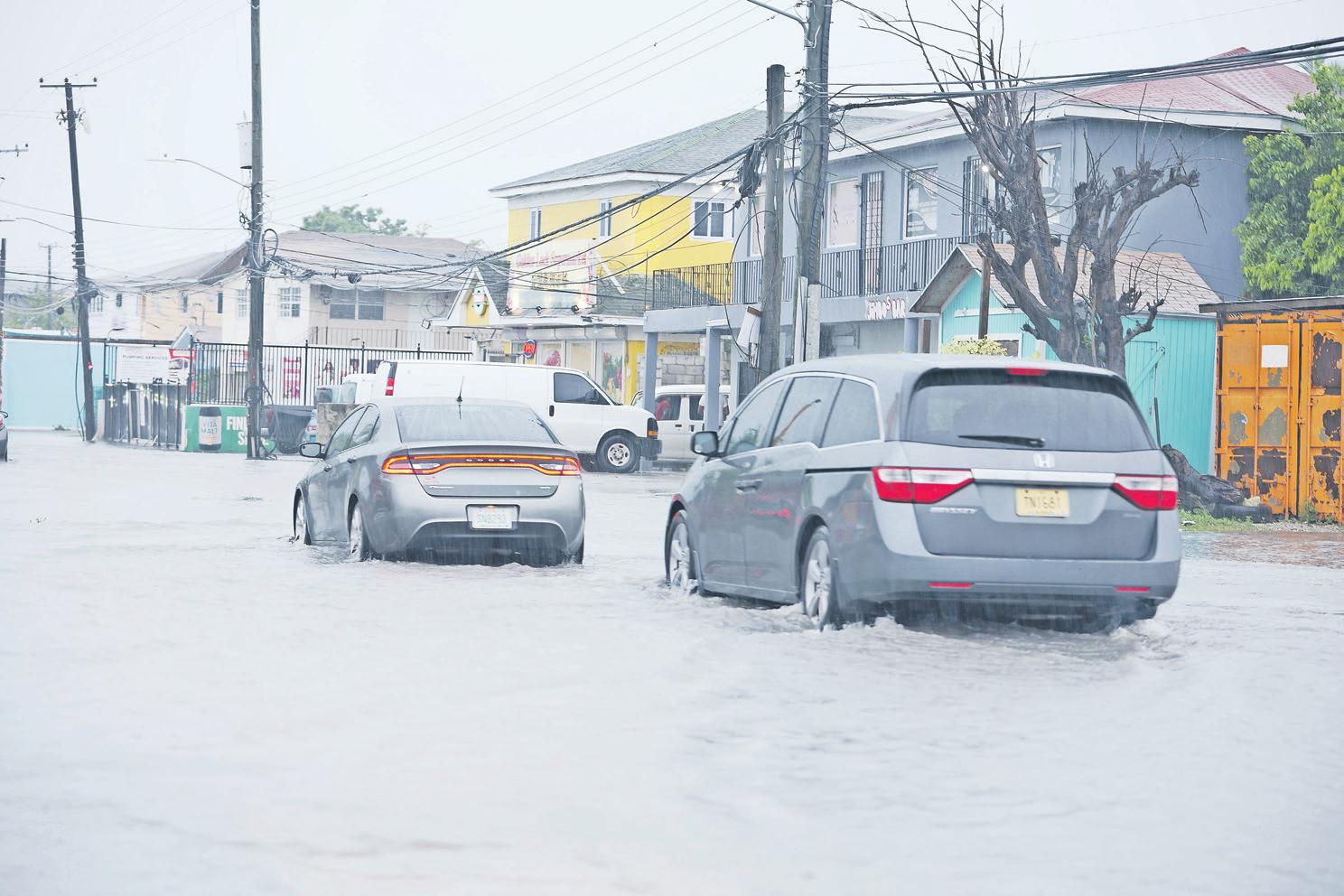
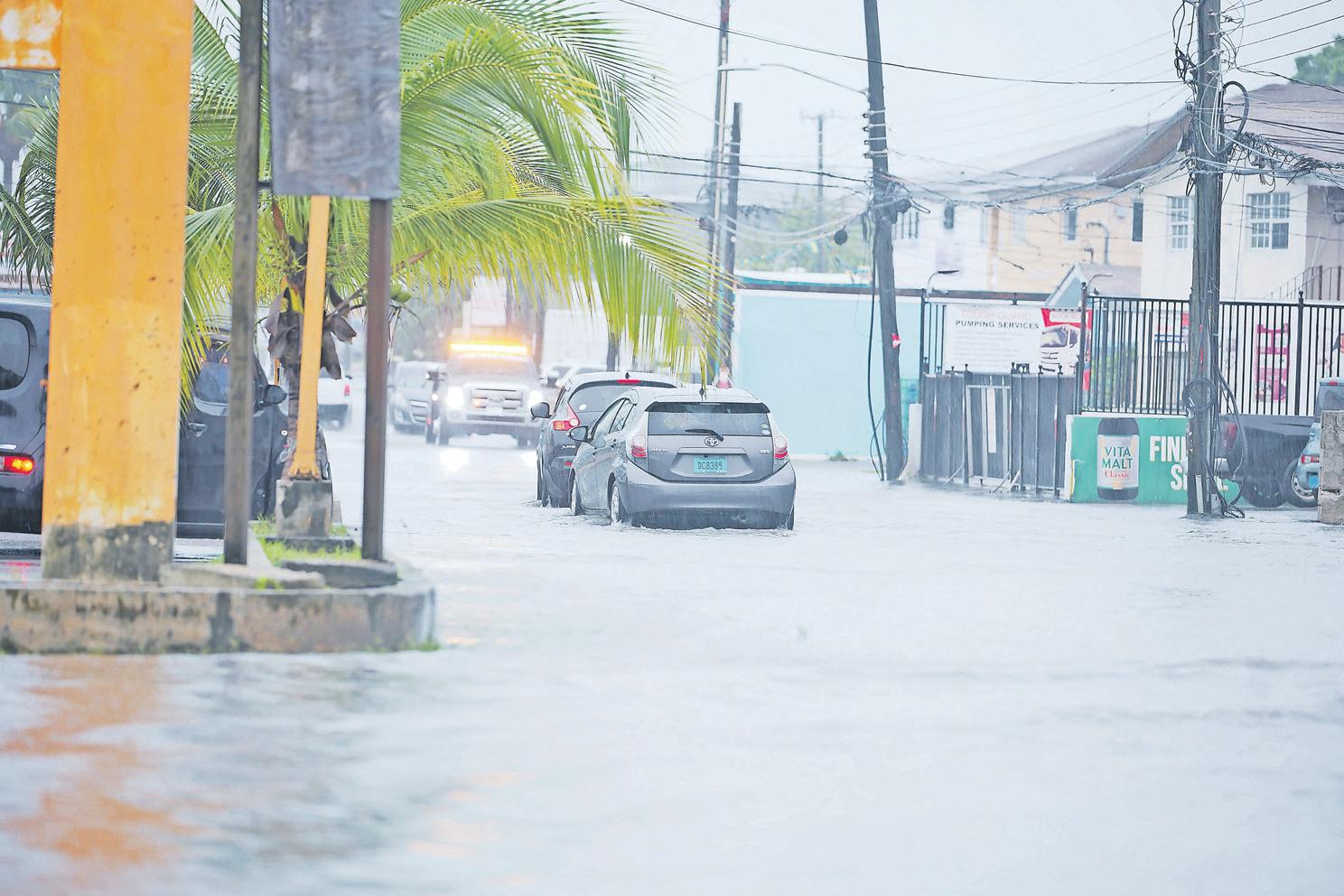
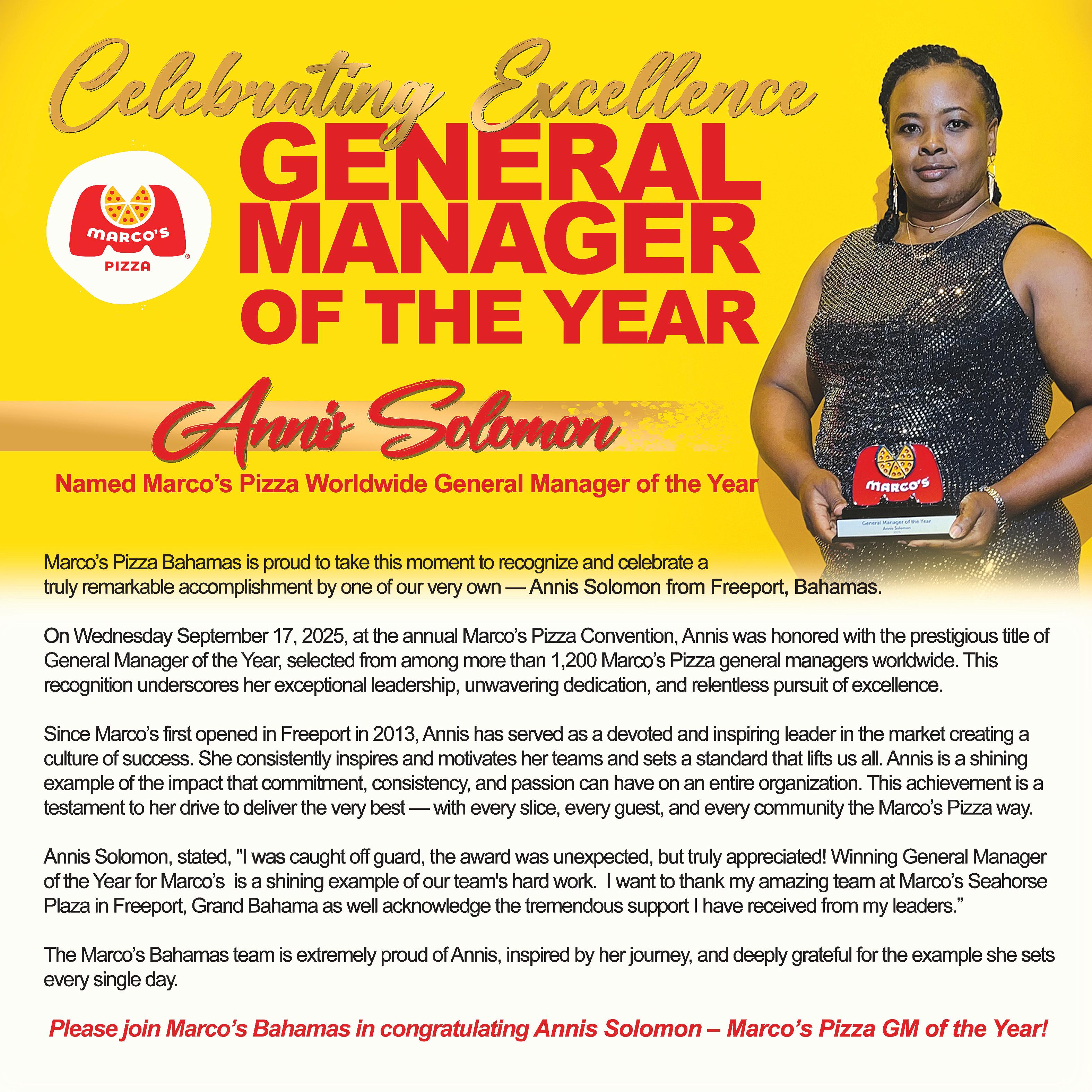
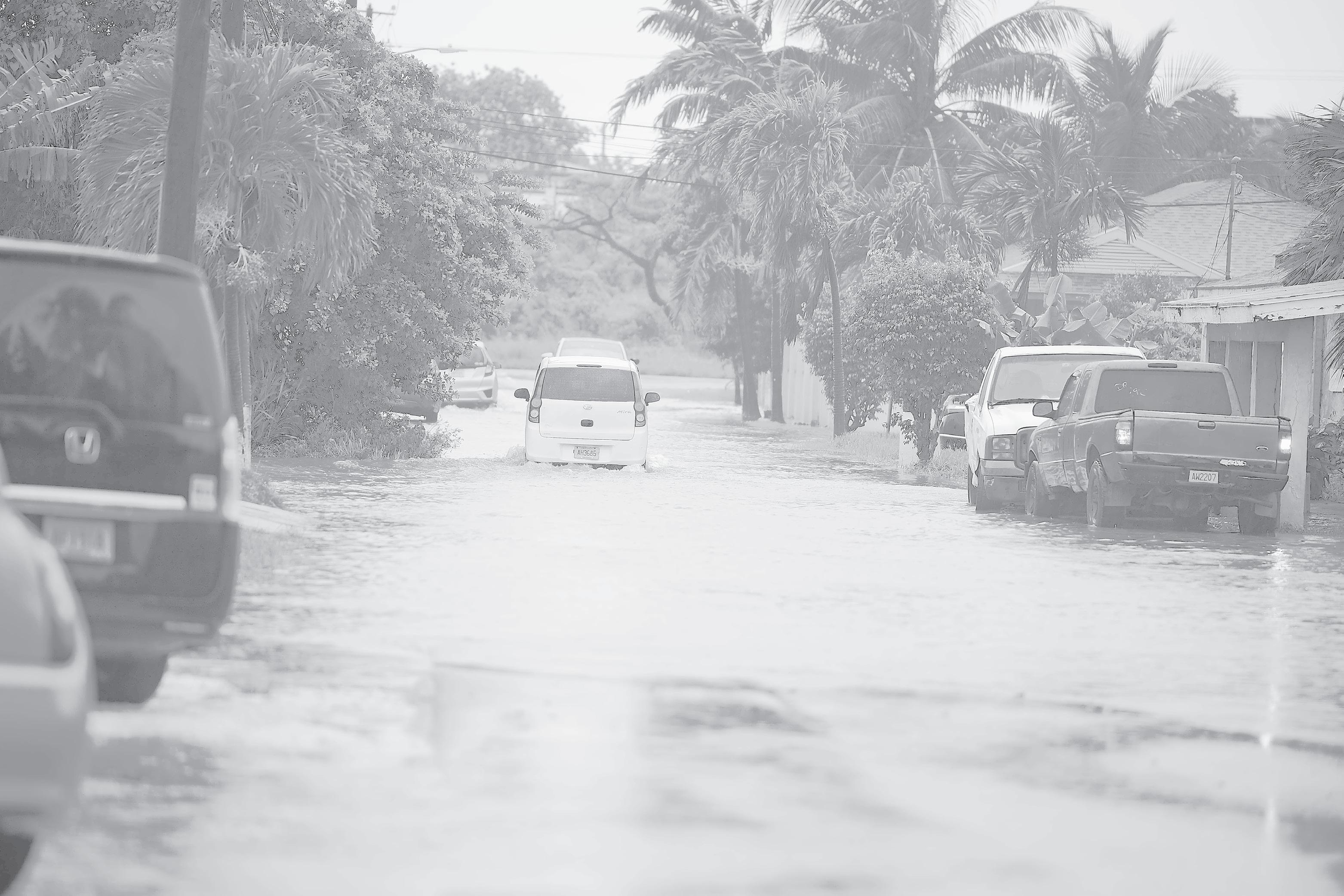
By PAVEL BAILEY
Tribune Staff Reporter
pbailey@tribunemedia.net
RESIDENTS across The Bahamas have hunkered down as Tropical Storm Imelda lashed islands with heavy rain and moderate winds, forcing flight cancellations, school closures and the shutdown of government offices.
Officials warned of flash flooding, storm surges and dangerous surf as the system continued its slow northern track.
The storm, about 100 miles west-southwest of the central Bahamas, strengthened into a tropical storm at 2pm on Sunday and was expected to reach hurricane strength by late today or tomorrow, according to the National Hurricane Center.
Imelda, formerly Tropical Depression 9, drenched Crooked Island, Acklins, Long Island and San Salvador on Saturday, prompting Bahamasair to suspend flights until the all clear. By Sunday evening, tropical storm conditions spread into the northwest Bahamas. Maximum winds reached 40mph, with forecasters warning of six to twelve inches of rain through Tuesday and surges of up to three feet in coastal areas.
The Disaster Risk Management Authority activated shelters
nationwide, including Nassau Village Community Centre and New Bethlehem Baptist Church on New Providence; South Andros Multipurpose Centre; schools and gyms across Grand Bahama; and Central Abaco Primary.
Minister of State for Disaster Risk Management Leon Lundy urged residents to stay off the roads and remain indoors.
Minister of Education Glenys HannaMartin announced that schools across Grand Bahama, Abaco, Andros, Berry Islands, New Providence, Eleuthera, Exuma and San Salvador would close on Monday, with reopening dependent on the all clear. The University of The Bahamas also suspended in-person operations, shifting to virtual learning.
Acting Prime Minister Chester Cooper ordered all government offices in affected islands to remain closed, except for essential workers. He urged the public to avoid “unnecessary risks,” confirming reports of flooding in lowlying communities.
“The relevant agencies, including police and defence force, are fully mobilised to respond to an emergency,” he said. Ports and airports will stay closed until further notice, with the Nassau Airport Development Company confirming
operations at Lynden Pindling International Airport remain suspended.
Western New Providence, including Adelaide, Coral Harbour, Coral Lakes and Albany, experienced outages Sunday afternoon. Bahamas Power and Light attributed the disruption to a transformer explosion near a defence force base, dispatching crews to restore service.
Residents on the islands already hit by the storm reported heavy downpours, service disruptions and precautionary cancellations, but many expressed relief that conditions were not as severe as feared.
On Crooked Island, Timothy Thompson expressed gratitude that conditions eased by Sunday afternoon despite heavy rain overnight.
In Andros, Pastor Leslie Duncombe said his community saw only rainfall but endured a water outage from late Saturday into early Sunday. He cancelled church services in line with advisories.
On Eleuthera, Pastor Orlando Thompson said power was knocked out for an hour on Sunday morning, though winds remained relatively light.
“While we experienced torrential downpour, there were no strong winds,” he said, adding that he also called off Sunday service as a precaution.
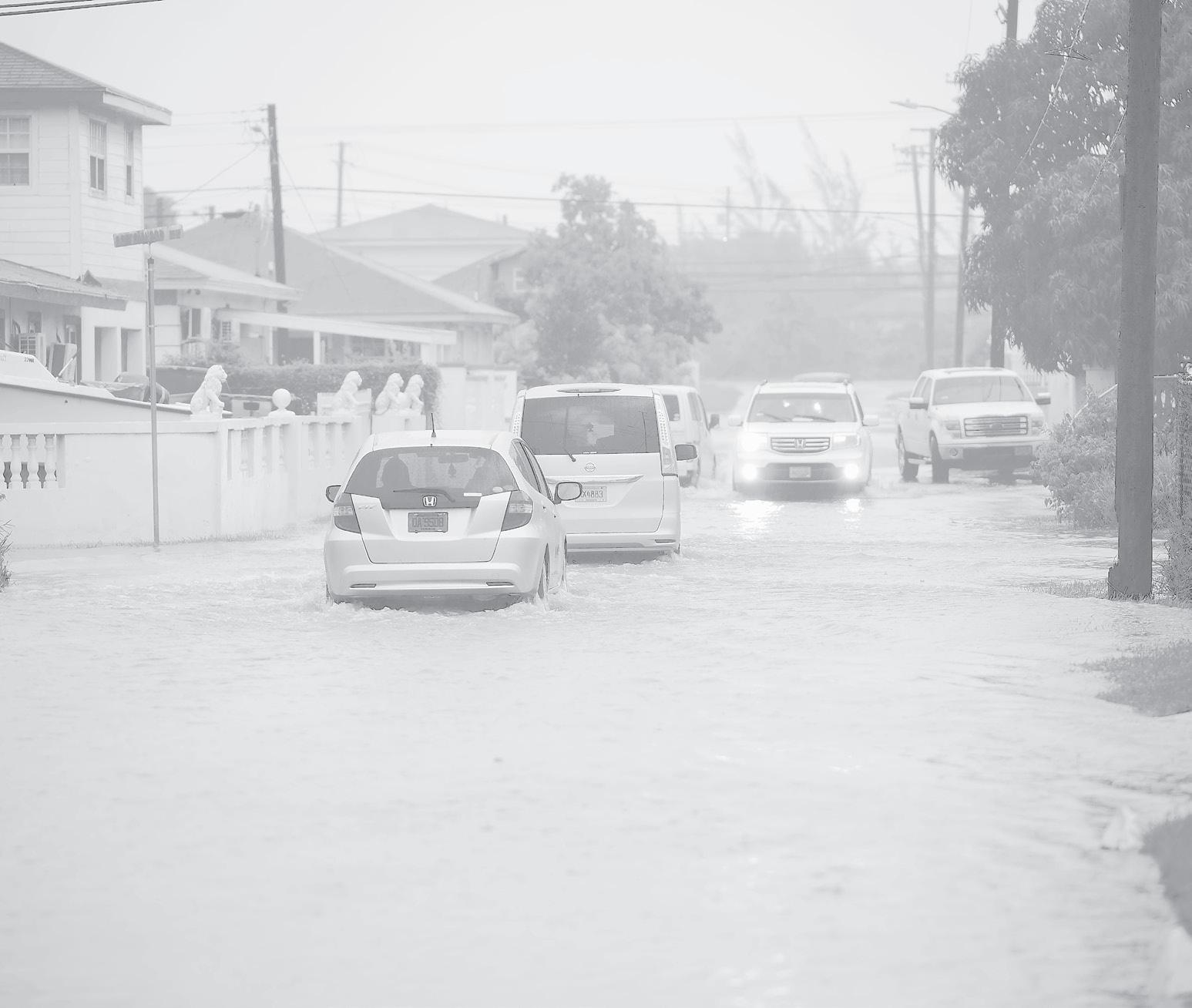
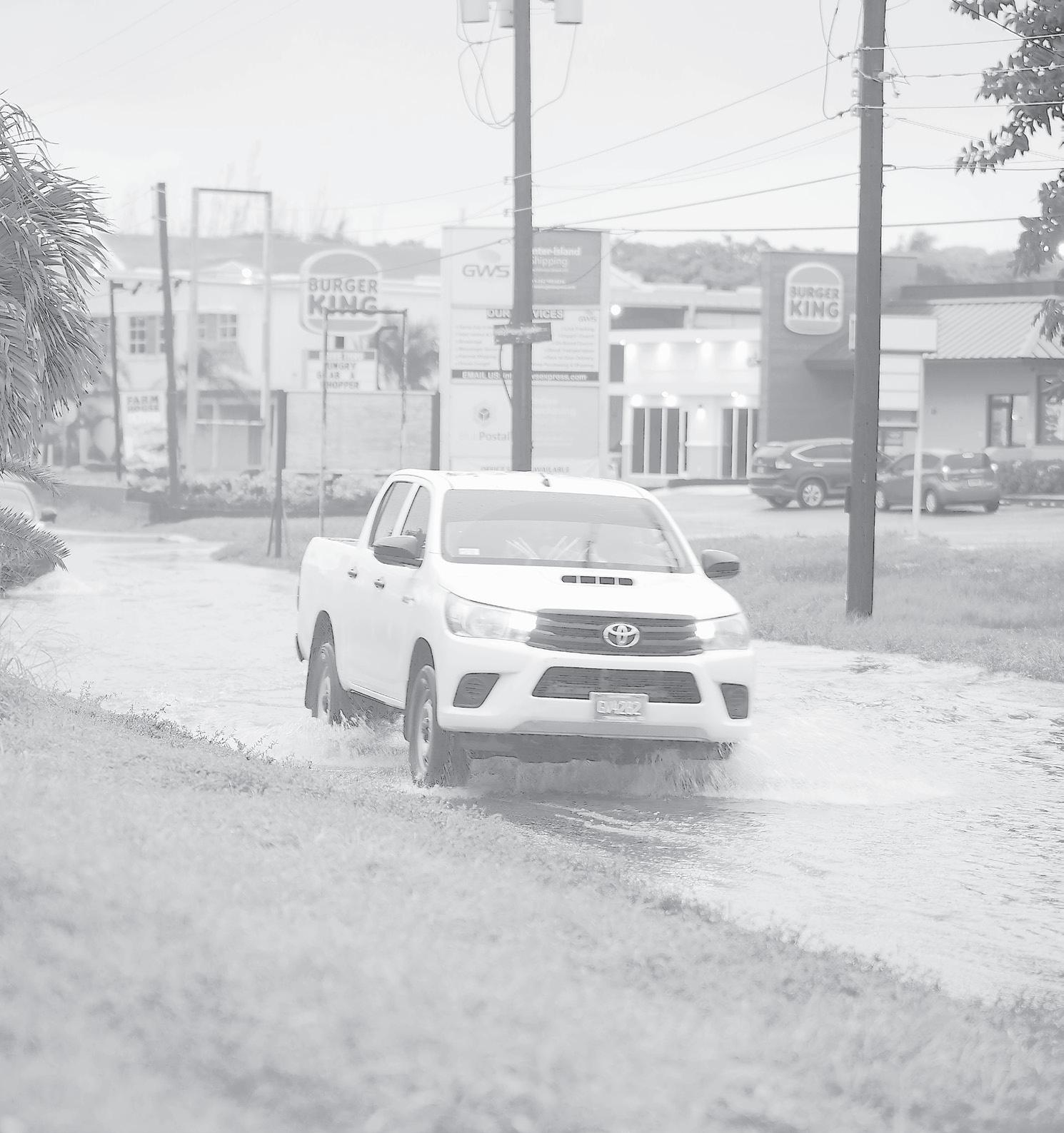

By EARYEL BOWLEG Tribune Staff Reporter ebowleg@tribunemedia.net
A 19-YEAR-OLD security guard was fatally shot in Fox Hill on Thursday while on his way to buy orange juice, after falling ill from suspected food poisoning.
Dennis Lightbourne had been weakened by dehydration and had not eaten since the day before, according to his sister, Domrihanna Anderson. He was gunned down when assailants in a white Japanese-model vehicle opened fire. The shooters fled the scene.
He was the only person injured in the attack. Relatives rushed him to hospital in a private vehicle, but he was later pronounced dead.
Ms Anderson said her brother fell sick on
Wednesday after eating a ham sandwich at work. On the day of his death, he told their mother that the food she offered him “tasted bad”. He also complained of itching and burning, prompting his sister to rub alcohol on his back.
“After six, he said ‘Sister, I going to buy this orange juice because I feel bad, I dehydrated, and I ain’t eat all day. So I coming back’,” she recalled.
Moments later, she heard gunshots. “That’s my first time hearing gunshots in my life,” she said. Their mother, who was at work, tried to reach him when someone arrived at their home with devastating news.
“The loss is devastating,” Ms Anderson said. “I feel like I lose everything. I loved my brother. My
brother was like my whole heart. My brother was like, my everything to me. I would be mad. He would come in and be like, ‘Why are you mad girl? Don’t ever let no one make you mad. Try and get up and laugh’.”
Lightbourne, originally from Acklins, graduated in 2023 from A Loftus Roker High School. He moved to New Providence after graduation, later relocating to Turks and Caicos where most of his family lived, before returning to New Providence in March.
His sister said he had no history of legal troubles.
She said he had recently bought a car and wanted to fix it. He also hoped to move into his own apartment and was planning a trip to Jamaica for his birthday in January.

THE Bahamas Technical and Vocational Institute (BTVI) is now internationally accredited by the Commission of the Council on Occupational Education (COE), opening doors for students to further their education at nearly 500 institutions in the network.
President of BTVI Dr Linda Davis said the institution is the first and only fully COE-accredited school in The Bahamas, describing the achievement as monumental for the country.
She said BTVI’s sites on New Providence, Grand Bahama, Eleuthera, Exuma, North Andros, Abaco, and Moore’s Island are now globally recognised for their work in technical and vocational education.
At a press conference at the Office of the

Prime Minister on Friday, Dr Davis said students who want to further their education abroad can automatically have their credits accepted to nearly 500 institutions registered within that network. She clarified that
students have been able to transfer their credits in the past; however, the COE accreditation will now boost students’ prospects.
Dr Davis said the accreditation process was “no walk in the park”.
In June, a 14-member
team from COE visited The Bahamas to do an extensive evaluation of BTVI’s seven sites. BTVI was measured by COE’s over 100 criteria across ten core standards. During that time interviews were done with faculty and staff, while data was rigorously scrutinised for academic standards, institutional quality, and student outcomes.
Dr Davis revealed that the COE review highlighted 16 findings of noncompliance but BTVI eventually met those standards. She said that the institution initially missed out on two core standards related to educational programmes and programme outcomes.
Officials reevaluated the way BTVI named its courses, numbered its credits, and tracked clock
hours. Dr Davis said they also had to make sure they had occupational advisory committees that asked faculty about BTVI’s graduation requirements, students’ progress, and dissected the potential future for graduates in the industry market. On Friday, Dr Davis acknowledged maintaining the accreditation will be hard work. BTVI will now have to submit an annual report to show it is meeting the standards of COE while also providing evidence of its efforts for the next four years. At the end of the fourth year, the COE will decide to reaffirm the accreditation or not.
“We need to give them evidence that we have 70 percent of our students completing and being placed in industry in areas
for which they have studied. We need to give data,” Dr Davis said.
For her part, Minister of Education Glenys HannaMartin underscored the importance of institutions teaching trades to diversify the economy, adding it is a crucial factor for sustainable employment. She described the accreditation as a powerful validation to students, parents, and industry partners.
The COE was selected as the international accrediting body due to its global recognition in the career and technical education sector and being endorsed by The Bahamas’ National Accreditation and Equivalency Council (NAECOB), according to officials. BTVI is also seeking national accreditation from NAECOB.
By DENISE MAYCOCK Tribune Freeport Reporter
dmaycock@tribunemedia.net
A MOTORCYCLIST
was killed in a traffic acci-
dent on Grand Bahama on Thursday night, bringing the country’s traffic fatality
count to 50 for the year.
Although police have not yet officially released the victim’s identity, he is believed to be Lavar Thompson. The crash happened shortly after 8pm on East Sunrise Highway near Chappy’s Pharmacy. Police said a
Your favourite massage therapist and esthetician is now offering you the services that you so love.
Now in a new location in Harbour Bay
Phone: (242) 810-6393 Monday - Saturday 10am-6pm by appointment ONLY

GMC Envoy travelling west made a right turn toward the pharmacy and collided with a blue-and-white motorcycle heading east.
Officers arriving at the scene found the 41-year-old motorcyclist unresponsive. Emergency Medical Services
examined him but detected no signs of life.
Superintendent Christopher Farquharson, officer in charge of the Traffic Division, said speed was a contributing factor.
The victim, who was wearing a helmet, died at the
scene. A white covering was placed over his body until morticians arrived.
“Although he was wearing a helmet, due to the speed, the accident became a fatality,” Supt Farquharson said.
Traffic was blocked for
By PAVEL BAILE Y Tribune Staff Reporter pbailey@tribunemedia.net
A MAN was sentenced to two and a half years in prison on Friday after he admitted to having $26,000 worth of marijuana in his
home on Lawton Avenue last week.
Prosecutors allege that De’kotdeo Carlos Outten, 36, was found with 13lbs of marijuana at his residence at 11am on September 24. The drugs seized in this canine-assisted bust have
about two hours while police investigated. The motorcyclist was later pronounced dead at the Rand Memorial Hospital. The driver of the GMC sustained minor injuries. Police said their investigations are continuing.
$26K OF M ARIJUANA
an estimated street value of $26,000.
Outten pleaded guilty to a charge of possession of dangerous drugs with intent to supply before Senior Magistrate Raquel Whyms.
Outten’s co-accused, Melbourne Smith, 79,
pleaded not guilty. The charge against Smith was withdrawn.
Outten was sentenced to two and a half years at the Bahamas Department of Correctional Services. Sergeant 2257 Wilkinson was the prosecutor.

divide, with tributes highlighting Mr Miller’s faith, character and service.
His brother, Bradley Miller, said the two last spoke at a cousin’s funeral in Grand Bahama the previous weekend. He believed his brother was in good health and unaware of any major medical issues, though later learned he had complained of chest pains and undergone inconclusive tests.
Former Tall Pines MP Leslie Miller, who helped Mr Miller with his re-election campaign, recalled that the minister had spoken of chest pains for months. “I think he might have been sick all the time and hide it, you know. I don’t know,” he said. “I just got off the phone from a friend who told me that he, one day he almost fell out at the airport with him, and he had to give him some Aspirin. He didn’t know what is wrong.”
Mr Miller’s death has
significant and immediate political implications. Under the Parliamentary Elections Act, a by-election must be held within 21 to 30 days of a writ being issued, sending some voters to the polls at a time when a general election must be called within the next year. Already there is chatter about what strategy Prime Minister Philip Davis may adopt in light of this development, and whether it could affect his calculus on when to call the general election.
Golden Isles is regarded as a swing constituency, with a history of flipping between the PLP and FNM. Political observers will likely treat the byelection result as an early referendum on the Davis administration’s standing and a signal of what may lie ahead in the national vote. Names circulating yesterday as top PLP contenders included Senator Darren Pickstock and Joe Johnson, chairman of the party’s Men’s Branch. The FNM
has already ratified Brian Brown as its candidate for the general election, and he is expected to be the party’s standard bearer in the byelection as well.
Mr Davis, who is out of the country, said he and his wife were “lost for words” over the loss of Mr Miller.
“Our country has lost a man whose life was dedicated to lifting others,” he said in a statement, noting Mr Miller’s career as a pastor, broadcaster, trade unionist and social activist. “His voice may now be silent, but the example he leaves behind will echo for generations.”
Zane Lightbourne, Minister of State for the Environment, described Mr Miller as a respected national voice. “Vaughn was not only a friend and a colleague, he was also my family,” he said. He was a respected national voice and a family man of strong Christian faith. While coming to terms with this loss, I take comfort in knowing that Vaughn loved


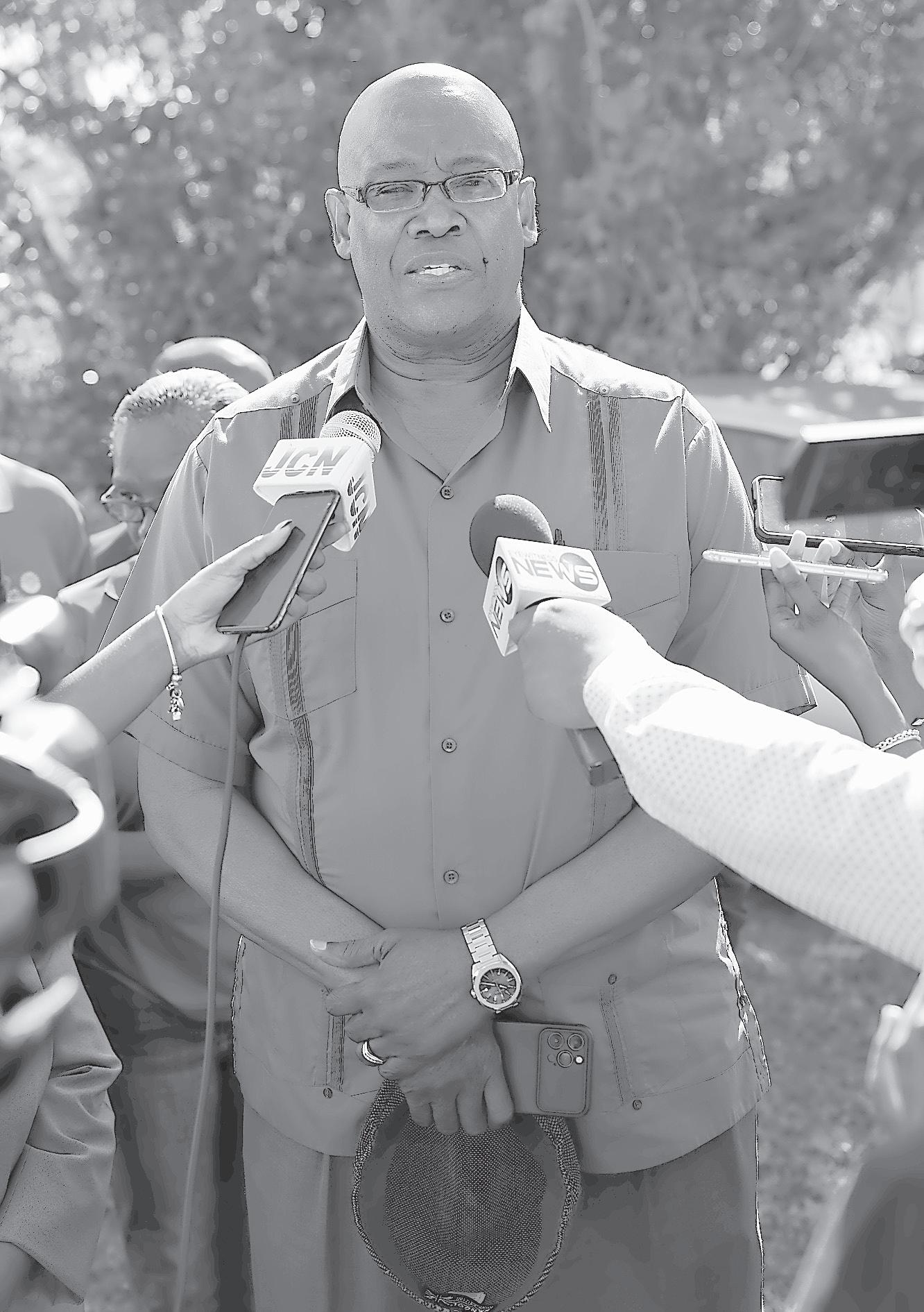
God and served his community and country with diligence.”
Opposition leader Michael Pintard called him a man of faith, a devoted husband, and a decent family man. “Though large in stature, Vaughn remained soft spoken and approachable—and unfailingly sought common ground despite political differences,” he said.
Mr Miller entered frontline politics in 2017 as the Free National Movement’s candidate for Golden Isles. He was fired as a parliamentary secretary in 2018 after voting against the Minnis administration’s
VAT increase and resigned from the FNM in 2019. He joined the Progressive Liberal Party the following year, citing his principles and disillusionment with government decisions, including the controversial Town Centre Mall lease.
A cancer survivor, he said the disease strengthened his resolve to stand by his convictions. He later served as environment minister in the Davis administration.
Mr Miller had recently indicated he would not seek re-election in 2026, citing a desire to spend more time with his young son, who lives in the United States with his wife.
His decision to step away from frontline politics also came as some PLPs in his constituency expressed a desire for a different candidate.
His death comes nearly two years after the sudden passing of Social Services, Information and Broadcasting Minister Obie Wilchcombe in September 2023, which triggered a by-election in West End, Grand Bahama and Bimini. In the November 2023 West End election, the PLP retained the seat when Kingsley Smith captured 2,150 votes to the FNM’s Ricardo Grant with 1,276 — a margin of 874.

NULLIUS ADDICTUS JURARE IN VERBA MAGISTRI
“Being Bound to Swear to The Dogmas of No Master”
LEON E. H. DUPUCH
Publisher/Editor 1903-1914
SIR ETIENNE DUPUCH, Kt., O.B.E., K.M., K.C.S.G., (Hon.) LL.D., D.Litt .
Publisher/Editor 1919-1972
Contributing Editor 1972-1991
RT HON EILEEN DUPUCH CARRON, C.M.G., M.S., B.A., LL.B.
Publisher/Editor 1972-
Published daily Monday to Friday
Shirley & Deveaux Streets, Nassau, Bahamas N3207
TELEPHONES
News & General Information
(242) 502-2350
Advertising Manager (242) 502-2394
Circulation Department (242) 502-2386
Nassau fax (242) 328-2398
Freeport, Grand Bahama (242)-352-6608
Freeport fax (242) 352-9348
WEBSITE, TWITTER & FACEBOOK
www.tribune242.com

@tribune242

tribune news network
IT is a shared experience no one wants. Collectively, we huddled in our homes yesterday, watching the rain lash the windows, listening to the roar of the wind.
For some, that wait is filled with more trepidation than others.
Those are the people who see the water rising, edging closer and closer to their homes.
And then there are those who will be impacted most by Tropical Storm Imelda’s effects as it strengthens, it seems, in Grand Bahama and Abaco. Both those places will feel the shadow of Hurricane Dorian as this new, much smaller storm approaches. The dread will not be diminished, however.
Earlier this year, a reader from Abaco told us of how their child still gets scared any time there is a roll of thunder or a downpour. It is not the fear of the new storm but the trauma of the old. We pray that Imelda will pass through quickly and without damage. Then there are those among us who
cannot shelter from the weather.
They are the rescuers. They are the emergency workers. They are the people who keep our country working come rain or shine.
Earlier on Sunday, a power outage hit parts of Adelaide after a transformer blew. Out went the crews to try to fix it.
Later last night, the sparks were flying not far from where we write, and again out came the crews to deal with it. While the world stops for so many of us, it does not stop for those who keep us going. As we write, there has been a rush of notices, announcing school closures, government offices shut down, banks, clinics and more - even a Zoom meeting postponed by the weather.
The Tribune will be open as usual, bringing the news, and we will be hoping you are all safe. Grand Bahama and Abaco, you are in our thoughts and prayers today. Stay safe.
EDITOR, The Tribune
I WOULD like to add my voice to the recent discussions in this newspaper about the state of our education system. Some years ago, while I was caring for my elderly father, I carefully arranged time in my week to volunteer at a government primary school. I worked one-on-one with children who were struggling, but what I saw was deeply troubling and shocking. At age eleven/twelve, there were a few children in grade six who were literally unable to recite the alphabet. Yet, because of the pressure to move large numbers of students through the school each year, children were promoted automatically regardless of their performance, and sent on to senior school. Even worse, the school seemed unable to prioritise the extra help these children so badly needed. Although the staff knew exactly when I was available for one-on-one tuition, time after time the children were pulled away for an assembly or a visiting speaker instead. After this happened on five separate occasions, I realised my efforts were being wasted, and I reluctantly stopped volunteering. It was both upsetting and frustrating. Education is not a luxury — it is the foundation of
a country’s future. Nelson Mandela said, “Education is the most powerful weapon which you can use to change the world.” But what hope do we offer our children when they are advanced through the system without the most basic skills, and when even well-meaning attempts at support are undervalued? Unless we make education a true national priority and treat it with the urgency it deserves, we are condemning a generation to struggle — and in doing so, we risk the very future of our country.
CONCERNED
Nassau, September 26, 2025.
EDITOR, The Tribune. UNEMPLOYMENT statistics all over the world follow seasonal patterns. At certain times of the year, new entrants to the labour market (like school leavers) swell the number of job seekers, while at other times of the year key industries (like tourism in our case) are in fuller swing than others. That is why, in every
other country with which I am familiar (including our northern neighbour, which we are in the unfortunate habit of copying in almost every other respect) statisticians and news media do not compare successive quarters when seeking to convey trends in unemployment. Rather, they compare May 2025 to May 2024 and September 2025 to September 2024, for instance. It is
EDITOR, The Tribune.
THE minimum wage debate in The Bahamas presents an illusion of progress dressed in economic subjugation that hides the true struggle for dignity in The Bahamas. Here is my view.
The formal abolition of slavery in 1834 promised a dawn of freedom, a definitive break from the brutal regime of chattel bondage. For The Bahamas, as for many post-colonial nations, this dawn has proven to be a long twilight, a state of perpetual struggle where the architecture of oppression has been renovated rather than demolished.
The modern economic system is a mere rebranding of the plantation that finds its most potent evidence in the daily reality of the Bahamian masses. These are the people who labor from sunup to sundown, and even into the darkness, yet cannot see tangible progress in their lives.
They are governed by a power structure that treats them as rebellious slaves, unruly subjects to be managed rather than citizens to be empowered despite sitting on the resources necessary for collective uplift.
When this profound historical critique is juxtaposed with the immediate, pragmatic debate over the minimum wage, a coherent and damning narrative emerges. The struggle for a living wage is not merely a policy dispute, but the contemporary front line in the centuries-old battle for true liberation from economic subjugation.
The perception that the modern Bahamas has become an unbroken extension of the plantation system is not mere rhetoric. It is a framework that elucidates the persistent power dynamics. The “Masters” of the old order have simply exchanged the title of plantation owner for that of economic oligarch or political gatekeeper. The “Field Workers” are today’s minimum-wage earners, construction workers, and hotel staff. They are the backbone of the economy who must still sell their labor to a system they do not control.
The critical difference is the illusion of agency. Where the slave was provided subsistence, the modern worker receives a wage, only to immediately surrender it for the basic necessities of life: shelter, food, and utilities. This creates a vicious cycle of paying for the privilege to exist on the very “plantation” they are forced to work.
The political class, or the “House Workers” in this stark analogy, are tasked with maintaining this system, offering symbolic gestures of empowerment while ensuring the fundamental structure of ownership and resource allocation remains untouched. This is the core of the betrayal. The worker
toils endlessly but remains economically enslaved, their labor enriching a minority while their own condition stagnates.
This systemic subjugation is most egregiously embodied in the management of the nation’s inheritance, the vast tracts of Crown Land.
Valued in the hundreds of billions of dollars, this asset represents the historical compensation owed to the people who built a nation with their uncompensated labor.
Instead of serving as the foundation for a sovereign wealth fund to generate intergenerational capital, it is subject to what can only be described as an “ongoing heist” disbursed through patronage, shrouded in secrecy, and alienated from the very people who are its rightful beneficiaries.
This is why the cry for external reparations, while morally justified, can be a strategic distraction. The true reparation, the land itself is already within the country, held in the Prime Minister’s office. The failure to leverage this wealth for the common good is the ultimate proof of the rebranded plantation thesis.
The leaders possess the “keys to the plantation house,” yet the masses continue to live in precarity, a reality that renders political independence a hollow victory without economic sovereignty. It is against this backdrop of structural failure that the debate over the minimum wage must be understood.
The proposal to raise the wage from $260 to $350 weekly is not just a technical adjustment, it is a direct challenge to the logic of the system. For the worker facing a declining standard of living, where the cumulative burden of VAT and inflation has eviscerated purchasing power, the current wage is a testament to their exploited status.
The government’s reluctance, driven by the political power of business owners, mirrors the historical dynamic where the concerns of the propertied class consistently outweigh the dignity of the laboring class.
The worker, in this calculus, is still treated as a rebellious slave whose demand for adequate compensation is an inconvenience to be managed and delayed, rather than a right to be honored.
I propose a solution of a gradual, incremental increase—$30 per year beginning in March 2026, and each January thereafter, ending in 2029 for a standard minimum wage of $380.00 weekly. This is a pragmatic compromise. It offers businesses predictability and aims to avoid economic shock from
a large one-time increase. However, from the perspective of the historical critique, this gradualism is a doubleedged sword. On one hand, it is a necessary, tactical step toward immediate relief, a recognition that within the existing system, change must be carefully negotiated. The boost to consumer spending and the potential for a virtuous economic cycle are real benefits that could slightly loosen the chains of economic precarity.
On the other hand, it risks perpetuating the very system it seeks to ameliorate. However, a gradual wage increase manages the symptoms of inequality without curing the disease of concentrated wealth and resource control. It is a reform that makes the plantation slightly more bearable without questioning the legitimacy of the plantation itself. I dare to say my belief in the need for a Reconciliation Commission using the historical analysis becomes profoundly relevant. Such a commission would transcend a historical autopsy; it would be a public audit of power. Its mandate would be to investigate the management of Crown Land, to trace the flow of national wealth, and to expose how the promise of emancipation was thwarted by the reality of economic entrapment. This Commission could create the political momentum necessary not only for a fair minimum wage but for a radical reimagining of economic justice, where national assets finally serve the national good.
In conclusion, the Bahamian laborer, working from dawn until deep into the night without seeing progress, is living proof of an unbroken chain of economic subjugation.
This debate over the minimum wage is a microcosm of this larger struggle. While incremental increases are a vital and necessary fight for dignity within the current paradigm, they are insufficient on their own. True liberation requires confronting the foundational injustice, the control of the nation’s wealth by a powerful few.
The path forward must therefore be twofold. To agitate relentlessly for immediate reforms like a living wage, while simultaneously organizing for the ultimate goal, the reclamation of the national inheritance. Only by seizing the “keys” to their own economic destiny can the Bahamian people finally break the chain that stretches from the plantation to the present, ensuring that the rising tide of progress does not just lift the yachts, but finally, and justly, lifts all boats.
Together, We Rise.
RABBI COMMON ZENSE
Freeport, Grand Bahama September 27, 2025.
universal and routine. The recent treatment by our media of the release of unemployment numbers for the first quarter of 2025 therefore conveys nothing more meaningful than our media’s inability to understand, interpret and therefore cogently report on trends in employment.
ANDREW ALLEN Nassau,
September 25, 2025.

THE newly elected leadership of the Bahamas Association of Land Surveyors (BALS) is launching an internal investigation after the association was expelled from the International Federation of Surveyors (FIG) in April 2025 due to unpaid membership fees exceeding three years.
BALS president Rodrick Wood said the exact amount owed has not yet been determined, but he
expressed concern that the expulsion could affect the international reputation of Bahamian surveyors.
The association intends to establish a “truth and reconciliation committee” to closely examine the matter. Once findings are available, it will determine the most appropriate course of action.
FIG, established in 1878, is a global non-governmental organisation representing surveyors. It
serves as a forum for discussion and development, promoting professional standards and practices worldwide.
Speaking at a press conference on Friday, Mr Wood said the expulsion notice was posted online. He shared a copy of what appeared to be FIG’s formal notification of BALS’s removal.
“This expulsion was a national embarrassment, as far as we’re concerned,” Mr
Wood said. “It was also a stark warning of things that we do not want to see happen again. It signalled a breakdown in the governance of our association, and again, we are committed to fixing this.”
Mr Wood continued: “We will not shy away from any negative thing that has happened in the past, but we will learn from it, and we will do our part to make sure that these type of things do not continue to
happen.”
“We’re going to move to immediately make a formal requisition or application to reapply for this membership in the FIG or the international body of surveyors. We will demonstrate that the Bahamas Association of Land Surveyors is now under a new accountable leadership that adheres to international standards and professional conduct.”
Mr Wood and other
BALS members were elected on September 12, 2025. Elections had not been held for five years. Although COVID-19 was a factor during that time, Mr Wood said there was sufficient opportunity after the pandemic to reorganise and conduct the elections.
The new team has not yet had a chance to meet or discuss with the previous leadership the reason for the arrears in membership fees, he said.
By PAVEL BAILEY Tribune Staff Reporter pbailey@tribunemedia.net
A JAMAICAN national was denied bail for his alleged involvement in the fatal shooting of 32-yearold James Sands at a Bimini marina in 2024.
Shandae Brown, 29, was denied bail for murder by Justice Andrew Forbes. Prosecutors allege that Brown shot and killed Sands at Fisherman’s
Village Marina in Bimini on August 15 2024. In opposing Brown’s bail, the prosecution submitted that the defendant allegedly admitted to the offence in a police interview. The defendant allegedly told police he shot the deceased twice because he feared for his life. It was further said that the defendant allegedly showed police where he discarded the weapon after the crime. They also claimed
Brown stated he had been bullied by the deceased for years. The prosecution said police interviewed multiple witnesses.
The prosecution argued Brown posed a flight risk, citing that he is a Jamaican national and Bimini’s proximity to the US. They also noted that the defendant evaded capture for two weeks before being caught after an island-wide manhunt.
Parkco Deal, Brown’s
counsel, countered that his client has no close ties to Jamaica, except for a grandmother who has since died. He added that Brown’s father is Bahamian and that the accused has strong ties here.
Mr Deal said his client maintains his innocence. He also said Brown is the sole breadwinner for a minor child.
Mr Deal claimed there were no witnesses who saw the defendant shoot the
deceased. Justice Forbes found the evidence against Brown cogent and reasonably strong.
While Justice Forbes acknowledged that the defendant’s trial is slated for next year, he noted Bimini is a small community and that Brown’s return would cause concern among residents.
He also highlighted the possibility of retaliation by the deceased’s friends
should Brown be granted bail, pointing to the fear the applicant expressed in his police interview. Justice Forbes concluded there were no conditions that could reduce risks associated with Brown’s release, making specific reference to his personal safety. However, he invited the defendant to reapply for bail should his circumstances change. Ashley Carroll represented the prosecution.
By PAVEL BAILEY Tribune Staff Reporter
A BUSINESSMAN on trial for allegedly importing firearms claimed that he had no idea guns were hidden in a box shipped by his company in 2023. Rolando Thomas, 44, testified before Magistrate Lennox Coleby as his trial continued.
Thomas is accused of importing ten firearms
and more than 100 rounds of ammunition through a courier company in June 2023. He faces 14 firearmrelated charges, including importation of firearms, possession with intent to supply, and conspiracy to import firearms and ammunition.
Police said they executed a search warrant at Secure Import Services, located off Tonique WilliamsDarling Highway, shortly before 3pm on June 20,
2023. Officers allegedly found ten unlicensed firearms along with 92 rounds of 9mm ammunition and 12 rounds of .40 ammunition. In his testimony, Thomas said he did not believe the weapons were inspected before arriving in The Bahamas. He claimed the box was shipped by Swift Courier Company in the US for his firm, Secure Imports on Gladstone Road, and insisted the firearms would have been
detected had the box been properly searched. Thomas said he did not know where the package was prepared or packed. He testified that he first became aware of its contents when police searched it and an officer shouted “gun” after pulling out a weapon. He claimed the firearms were concealed beneath snacks and clothing in a black and grey bag.
The defendant maintained the guns were not
his and that he had never seen them before. He said the box, sealed with tape and bearing a Home Depot label, listed the names Ryan Neely and Glinda Williams. According to Thomas, Neely was a customer who regularly shipped clothing to relatives in The Bahamas but is now being detained by US Immigration and Customs Enforcement in Texas. He said the box was collected by Neely’s child’s
them details about the customer and his own contact information. He said he spent five days in custody after being arrested and questioned at the Central Detective Unit. Bjorn Ferguson represents Thomas. Assistant Superintendent Lincoln McKenzie is prosecuting the case.
By PAVEL BAILEY Tribune Staff Reporter pbailey@tribunemedia.net
A MAN awaiting trial for a 2016 armed robbery in Grand Bahama has been remanded after his bail was revoked, with the court noting both his safety concerns and past breaches. Meshack Newton, 41, had his bail revoked by Justice Andrew Forbes. He was initially granted bail of $9,900 with one or two sureties in August 2019 while awaiting trial for the alleged armed robbery. In June 2020, his mother, Antoinette Cartwright, and uncle, William Cash, applied to withdraw as sureties. Ms Cartwright told the court she wanted
By PAVEL BAILEY Tribune Staff Reporter
pbailey@tribunemedia.net
AN inmate was sentenced to an additional 15 months in prison on Friday after he admitted to having a phone smuggled to him by drone.
Police allege that Jason Joseph, 25, was found with a prohibited grey Unnecto mobile phone with wired headphones on April 5.
The phone was reportedly smuggled into prison using an aerial drone. Joseph was serving a sentence for a prior firearm conviction.
He pleaded guilty to a charge of possession of a prohibited item in a correctional facility before Magistrate Lennox Coleby.
Assistant Superintendent of Police Lincoln McKenzie called the offence unacceptable. He said the use of a drone in crime posed a risk to national security and that a strong message had to be sent. Joseph was sentenced to 15 months in prison. The sentence will commence after he finishes the remaining six months of his gun conviction.
To advertise in The Tribune, contact 502-2394
to do so because Newton had threatened her, including once with a cutlass. Newton later failed to appear for case management on September 30 2024, prompting the court to issue a warrant for his arrest. Prosecutors told the court that weeks earlier, on September 14, Newton was arrested by United States Marine Enforcement Units
and charged with human smuggling.
The following day, he was read his Miranda rights and chose to speak without an attorney. During that interview, he claimed a bounty had been placed on his life in The Bahamas over missing or stolen guns and money, and expressed a desire to remain in the US for his safety.
At a hearing last October, Ms Cartwright asked that the sureties not be made to forfeit their bond, citing financial hardship.
Justice Forbes agreed, ruling that the bond would not be forfeited, noting the family’s application to withdraw had gone unheard for years.
However, the judge revoked Newton’s bail, citing both his breach of conditions and the need to protect him. He was remanded to the Bahamas Department of Correctional Services. Justice Forbes noted Newton’s trial is set for May 2027 and said he may apply for bail again ahead of that date. Sean Smith prosecuted the matter.

MONDAY, SEPTEMBER 29, 2025
By MALCOLM STRACHAN
THERE is a line made famous by legendary musician John Lennon, who sang: “Life is what happens while you’re busy making other plans.”
As I write this article, the would-be Tropical Storm Imelda is starting to pound the windows with rain, and The Bahamas has woken up to the shocking news that Environment Minister Vaughn Miller has died. This article is about neither of those matters.
It is too soon to write about what this storm will or will not do – though there are matters that are surprising such as the lateness of the briefings about the storm and the prime minister speaking in New York about the danger of the storms rather than hopping on a plane sooner to come home and deal with them. With luck, those will be mere footnotes if the storm passes without serious damage or danger to life and limb.
It is also too soon to write about what happens next after the passing of Vaughn Miller. It will of course trigger a bye-election, and with a general election not far away, that will be a bellwether for the direction of the voters, but first people must be allowed to mourn a minister, a colleague, a friend, a family member.
Instead, this week, the subject is artificial intelligence – and particularly its use by students.
It is hard to get away from artificial intelligence these days. I open up my writing software and it offers to write a story for me – I assure you these words are all mine, no machine lent a hand here. I get an email and there are automated suggestions for replies, all of them quite useless. I contact a support line for help and get an AI helper responding up to the point that it can’t help and passes me on to a real person.
And, in particular for this column, I sometimes hear one of my children asking an AI helper for the answers to some homework.
The president of the Bahamas Union of Teachers, Belinda Wilson, talked about the subject last week.
The use of AI by students is a big topic. Around the world, schools have been grappling with the issue – a quick search will find stories in the UK newspapers, in the New York Times, the LA Times, the Washington Post. Pick a country, its leading newspapers will have written about it.
The challenge is obvious – teachers need to make sure that students are really learning and not just asking a machine to turn something in that will get them a good mark. The point of giving a student math homework, for example, is to be able to assess that the student can do the sums, get the right answers. If all the student does is go and ask Siri or Alexa or ChatGPT for the answers, there is no point. It is not about the answers, it is about the learning.
Dealing with that is a discussion that teachers should be involved in at all levels – including having discussions with parents. For other parents, it will probably come as no surprise that I have had no such communications from school – and I would imagine it is the same for almost everyone else.
It seems it is the same case for the teachers too – with Mrs Wilson saying there has been nothing from the government on the issue either.
“The Ministry of Education or no official from the Ministry of Education has ever even mentioned AI to me as the union leader, and teachers have not said that they have had any communication or interaction about AI,” she said. “We have not yet, as a union or as a government or as a Ministry of Education, even mentioned artificial intelligence and as stakeholders, I contend that we must start the conversation of artificial intelligence sooner than later.”
Read this bit again: “We have not yet… even mentioned artificial intelligence.”
This is a debate going on around the world and we have not even sat down to talk about it yet.
Some teachers are certainly already noticing the use of AI in action.
Mrs Wilson said that some teachers are already flagging homework assignments that look like they have been done using AI software such as ChatGPT.
How can the teachers tell? Well, AI has its own way of writing that is often very different from the way students write. It can often have more formal structures, use vocabulary that is less common, and so on.
Good teachers know their students, they know the level of work that they normally submit. So when something comes in that looks different from the usual, they suspect something is up.
Mrs Wilson said: ““They also would note that the vocabulary that the student is using is not the normal, ordinary vocabulary that the students usually use in the classroom or when they taught them in previous years, the structure of their essay or their writings. It’s just they know that it’s not the way that they would have taught them in the class.”
In October last year, the Education Director, Dominique McCartneyRussell had said officials were drafting a policy on AI use in schools. By the sound of things, it has not gone very far if no one has talked to teachers about it.
AI is not going away –and frankly it is going to get harder and harder to detect it as it adapts to other writing styles. Using AI is going to be a life skill – students are going to find it to be something they might use throughout their future careers, so learning how to use it is important too. But it must not get in the way of the groundwork of learning.
If I am an employer, and I hire someone who has passed their math and English exams with, say, B grades, I want to know they

have the skills to back that up, and not just that they got an AI to do the work for them.
The use of AI is widespread – it would be stupid to pretend otherwise. Two professors at the University of York, Prof Leo McCann and Prof Simon Sweeney, got it spot on in an article in the UK Guardian when they said: “Claims that AI helps preparation or research is simply cover for students taking shortcuts that do not develop their learning skills… generative AI results in generic, dull and often factually incorrect output.”
All of this perhaps leads to a bigger question – what is education about anyway?
AI is a tool, but the worry is that it gets in the way of learning itself. That might not be the only way we need to consider how our students learn to learn – but it is certainly something we should be talking about.
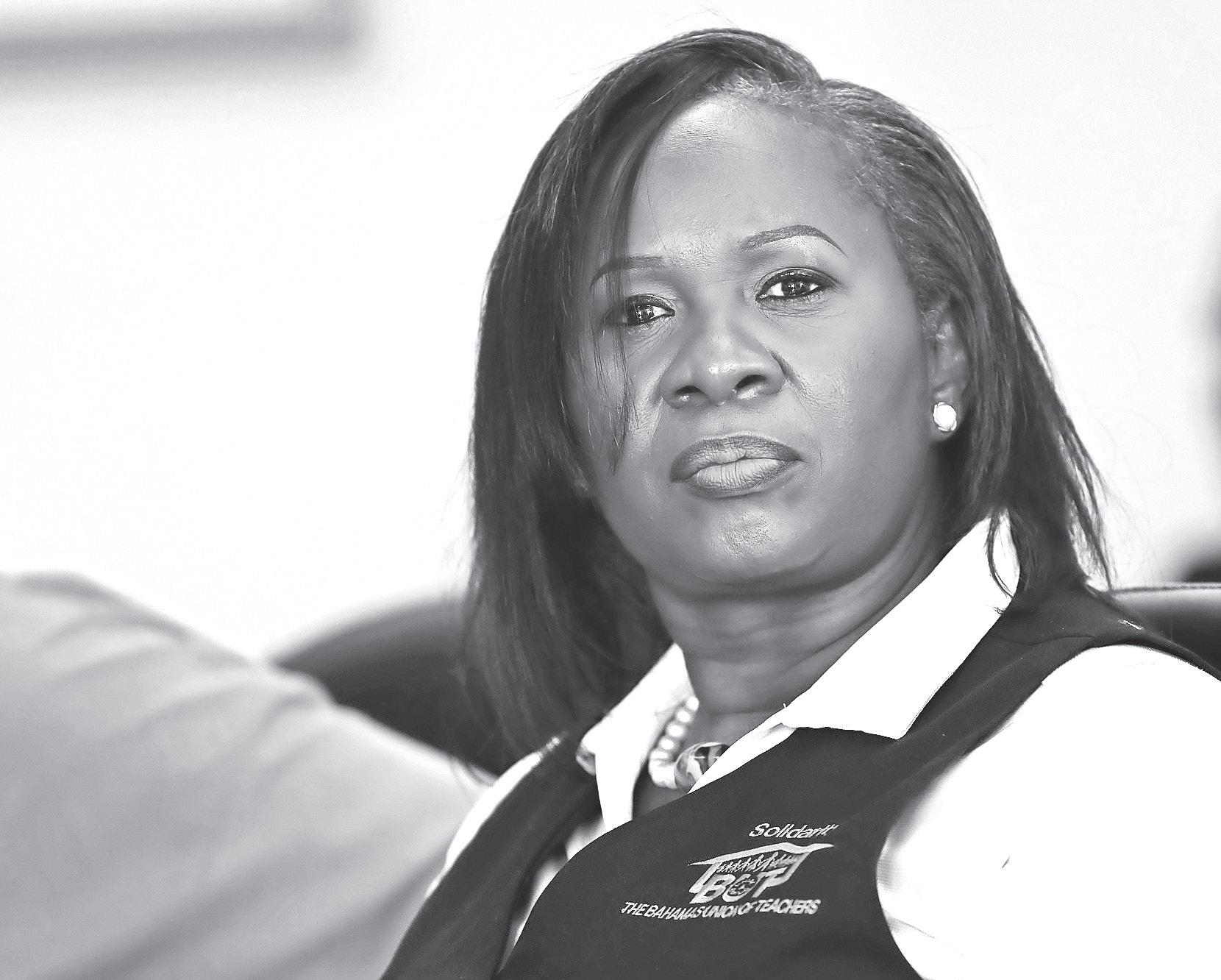
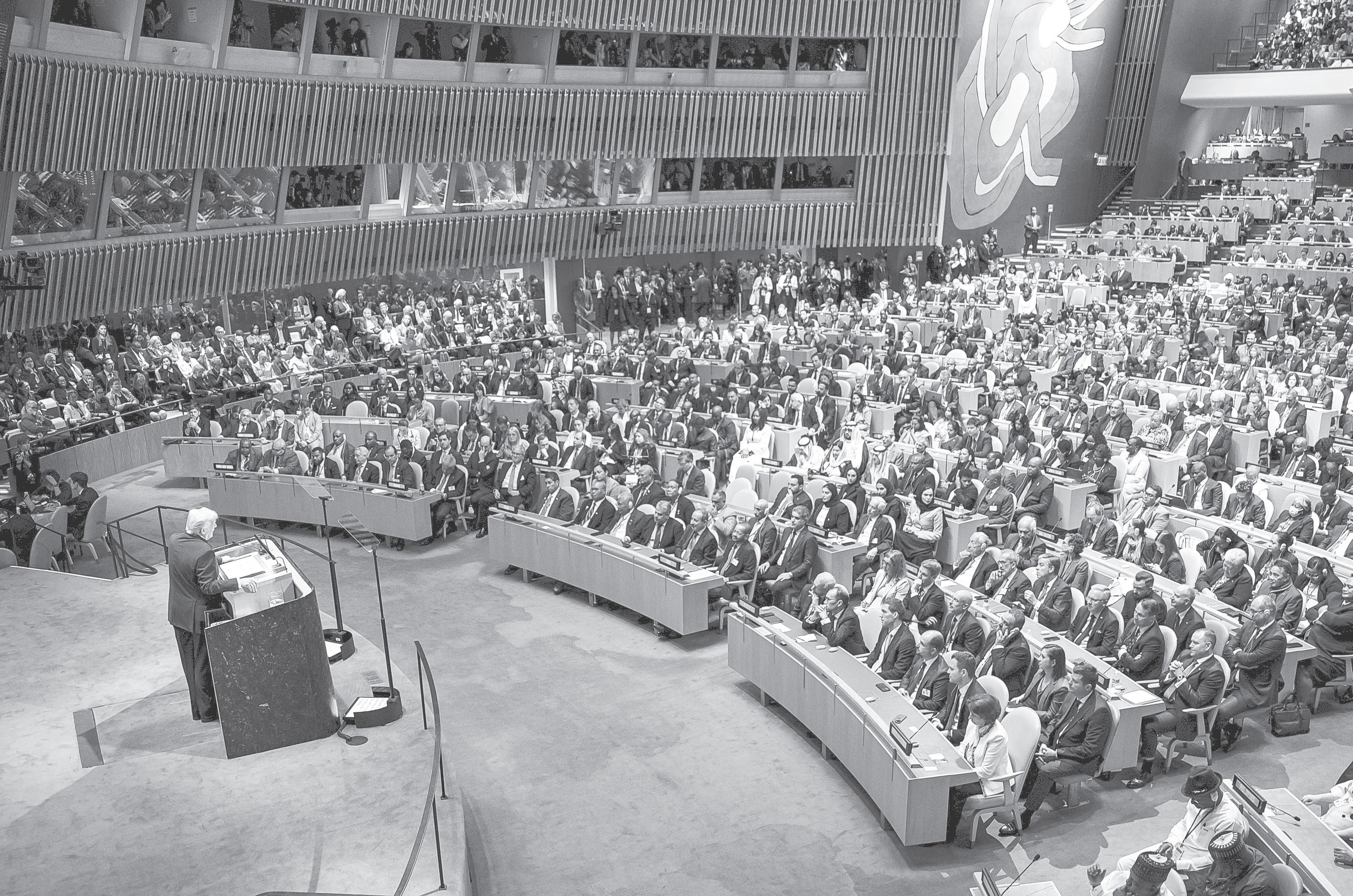
ON SEPTEMBER 23, US President Donald Trump used his address to the 80th session of the UN General Assembly to question the organisation’s purpose. He is not alone; leaders worldwide have asked the same question.
The UN has such tremendous potential,” he said, but it is “not even coming close,” and “empty words don’t solve war.” On that point, many would agree.
However, many countries contend that the UN falls short because real control rests with a few powerful states that wield veto power in the Security Council to serve perceived national interests. In consequence, the principles of the UN Charter - and at times
By SIR RONALD SANDERS
international humanitarian law - are set aside, raising serious doubts about the system’s fairness. As the General Assembly met, the point was driven home. By September 25, Israel had intensified operations in Gaza City and elsewhere, with rising casualties, mass displacement, and a deepening humanitarian emergency. The Integrated Food Security Phase Classification (IPC)
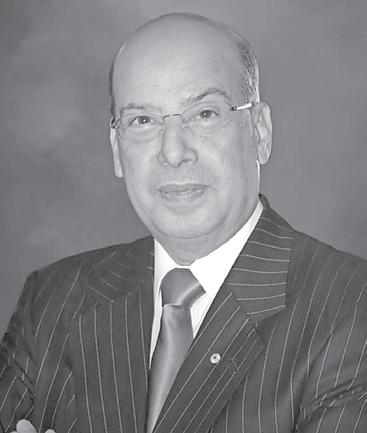
confirmed famine in Gaza Governorate on August 22 and projected expansion to other areas by late September.
Global anger over the war and civilian suffering has broadened diplomatic responses. In the days around UNGA, the United Kingdom, Canada, France, Australia, and Portugal recognised the State of Palestine. Taken together, 157 of the UN’s 193 member
states - about 81 percentnow recognise Palestine.
In his address, President Trump argued that recognising Palestine would “reward” Hamas for the October 2023 attacks. By contrast, most countries that spoke, including Caribbean states, condemned Hamas while reaffirming that Palestinians have a right to statehood alongside Israel. Hostage releases and an end to indiscriminate attacks were widely demanded, as was a political track that pursues the institutionalization of two states.
Countries also stressed that grave concerns about violations of international humanitarian law must not be conflated with antisemitism. Criticism of the
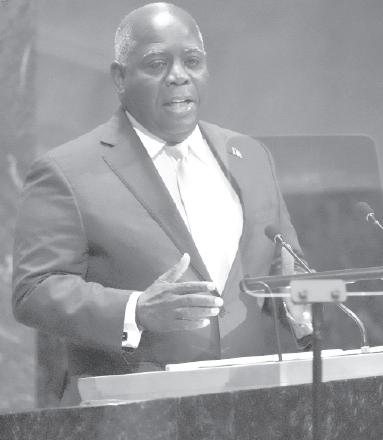
‘If the Bahamas were to collapse because of the disproportionate risk we face from climate change, economic vulnerabilities and external geopolitical pressures, the world would lose more than one of the best tourist destinations on this planet. We ask for nothing more than what we all want: the right to live in peace and security and in the pursuit of happiness. Most of all, just let us live. Just give us the right to live!’
— Prime Minister Philip Davis at the United Nations
policies and actions of Prime Minister Benjamin Netanyahu’s government is not a commentary on Jewish people anywhere. The suffering and perseverance of Jewish communities are part of humanity’s collective memory; invoking that history to shield present policies from scrutiny is unjustifiable and diminishes the fight against antisemitism.
Perhaps the clearest divergence between President Trump and most UNGA speakers - especially small states - was on climate change. The President called climate change “the greatest con job ever perpetrated on the world”.
For small islands, this is not ideology but survival: stronger storms, rising seas, and soaring insurance costs are already eroding economies. As Palau’s President Surangel Whipps Jr put it during UNGA week, “Those with the greatest responsibility and the greatest capacity to act must do far more,” noting that an advisory opinion by the International Court of Justice grounds this in international law.
Talking about CO2 emissions, the main driver of climate change, President Trump argued that Europe’s cuts had been “wiped out” by a global rise “much of it coming from China”, adding that “China now produces more CO2 than all the other developed nations in the world”.
Small states acknowledge the point, saying that it reinforces the case for all major emitters to cut. Notably, on September 24, China announced a target to cut its greenhouse-gas emissions by 7–10 percent below peak levels by 2035. Small states, contributing least to CO2 emissions yet suffering most, would agree with UN SecretaryGeneral António Guterres, who put the issue plainly at a UNGA climate meeting: “The science demands action. The law commands it. The economics compel it. And people are calling for it.” He warned that current pledges are inadequate and linked the climate crisis to a wider risk - multipolarity without effective multilateral institutions “courts chaos.”
This exchange signals tougher terrain across UN institutions, including the Paris Agreement and COP talks. The US has stepped back, while China’s assessed
share of the UNFCCC budget is set to rise under the newly approved 2026–27 budget. This is a bureaucratic increase, not a new voluntary climatefinance pledge. Even so, US policymakers should worry that their absence leaves more space for others to shape norms and agendas.
Small states, including in the Caribbean, want the United States engaged, not only for its resources, but because US climate impacts spill across the neighbourhood, driving up insurance and transport costs that already-strained Caribbean and Central American economies struggle to absorb.
Caribbean states share President Trump’s oftenstated desire for world peace. They welcomed his remarks on the war in Ukraine, following a meeting with President Volodymyr Zelenskyy in the margins of the UNGA. He said he now believes Ukraine can take back all its territory and urged quicker progress. Any US initiative to secure such a development would be welcomed across the Caribbean.
So, is the UN still of value to small Caribbean states, despite big-power domination of Security Council decisions, influence over the UN’s budget and priorities, and sharp differences on vital matters? The answer is still yes, but with clear limits.
The UN remains the only place where all states are present, where the record is public, and where small countries can put their concerns on the agenda and – if they are brave and astute - question major powers. Specialised agencies still deliver concrete services that benefit small states. But credibility is strained when rules are applied unevenly, financing is volatile, science is treated as optional, and equity of membership is denied. Small states do not have the luxury of disengagement. The task is to use what still works, while being clear that constraints come from members, not the Charter.
By THE ORGANIZATION FOR RESPONSIBLE GOVERNANCE (ORG)
AS A tropical storm currently affects The Bahamas, we are reminded how essential timely, accurate, and transparent information is in moments of crisis.
Hurricanes and storms are not just natural events; they are tests of our resilience, our trust in institutions, and our ability to act together. Communities that receive clear, credible information are more likely to prepare responsibly and recover quickly. Those in the dark are left vulnerable.
This week, on September 28, the world recognises International Day for Universal Access to Information, a UNESCOproclaimed observance
affirming the public’s right to know. In The Bahamas, the Organization for Responsible Governance (ORG) is marking the day with our annual Access to Information Week (September 28–October 5), under the theme: “Ensuring Access to Environmental Information in the Digital Age.” As one of the most climate-vulnerable nations in the world, the link between information, resilience, and sustainability could not be stronger.
Access to information is not just about political accountability. It is about survival. Reliable environmental data, on storm tracks, coastal erosion, water security, or energy use, helps families make life-saving decisions, strengthens disaster preparedness, and enables citizens to engage meaningfully in national planning. It empowers journalists to report responsibly, businesses to plan sustainably, and civil society to advocate effectively for environmental protection. Without transparency, communities are left to navigate the growing risks of climate change without a compass.
Yet, despite passing the Freedom of Information Act (FOIA) in 2017, The Bahamas has yet to fully enact it. Key provisions that would allow citizens to formally request and receive government-held information remain stalled. Multiple administrations have spoken about implementation, but timelines and resources remain unclear. Bahamians are too often left to rely on rumor, incomplete updates, or politically filtered messaging, dangerous gaps in a nation that faces annual hurricane threats and longterm climate risks.
This shortfall is especially
glaring given our government’s recent signing of the Escazú Agreement, a regional treaty that obligates countries to guarantee access to environmental information, ensure public participation in decisionmaking, and protect environmental defenders.
Signing is a step, but without implementation, it is only words on paper.
Widening this gap is the polarised political rhetoric that increasingly colors our national conversations. When transparency is framed as a partisan tool rather than a shared necessity, citizens grow disillusioned and disengaged. Participation declines, cynicism deepens, and resilience erodes. For The Bahamas, where trust and cooperation are essential to disaster response and longterm climate adaptation, this is more than a political problem. It is a national risk.
The consequences of weak transparency are profound: slower disaster response, unsustainable use of natural resources, reduced investor confidence, and weakened public trust. But the opportunities are just as powerful. A fully enacted FOIA, paired with Escazú commitments and digital tools, could transform governance. It could build trust between government and people, attract responsible investment, and strengthen collaboration across sectors. Most importantly, it would empower citizens to make informed decisions that protect lives, livelihoods, and the environment.
That is why ORG is proud to launch Access to Information Week, in partnership with civil society, media, and community leaders. This campaign will highlight the role of FOIA and Escazú in supporting sustainable development, disaster resilience, and environmental stewardship. It will provide citizens with tools to “Get Informed and Get Involved”, and encourage broad advocacy for full enactment and funding of FOIA.
Access to information is not a privilege. It is a right. And for The Bahamas, a lifeline. In the face of stronger storms, rising seas, and growing global uncertainty, transparency is not optional. It is the foundation of resilience, sustainability, and public trust. If we want to weather the challenges ahead, we must make transparency the rule, not the exception. Trust is built when information flows freely, and trust is what carries a nation through the storm.

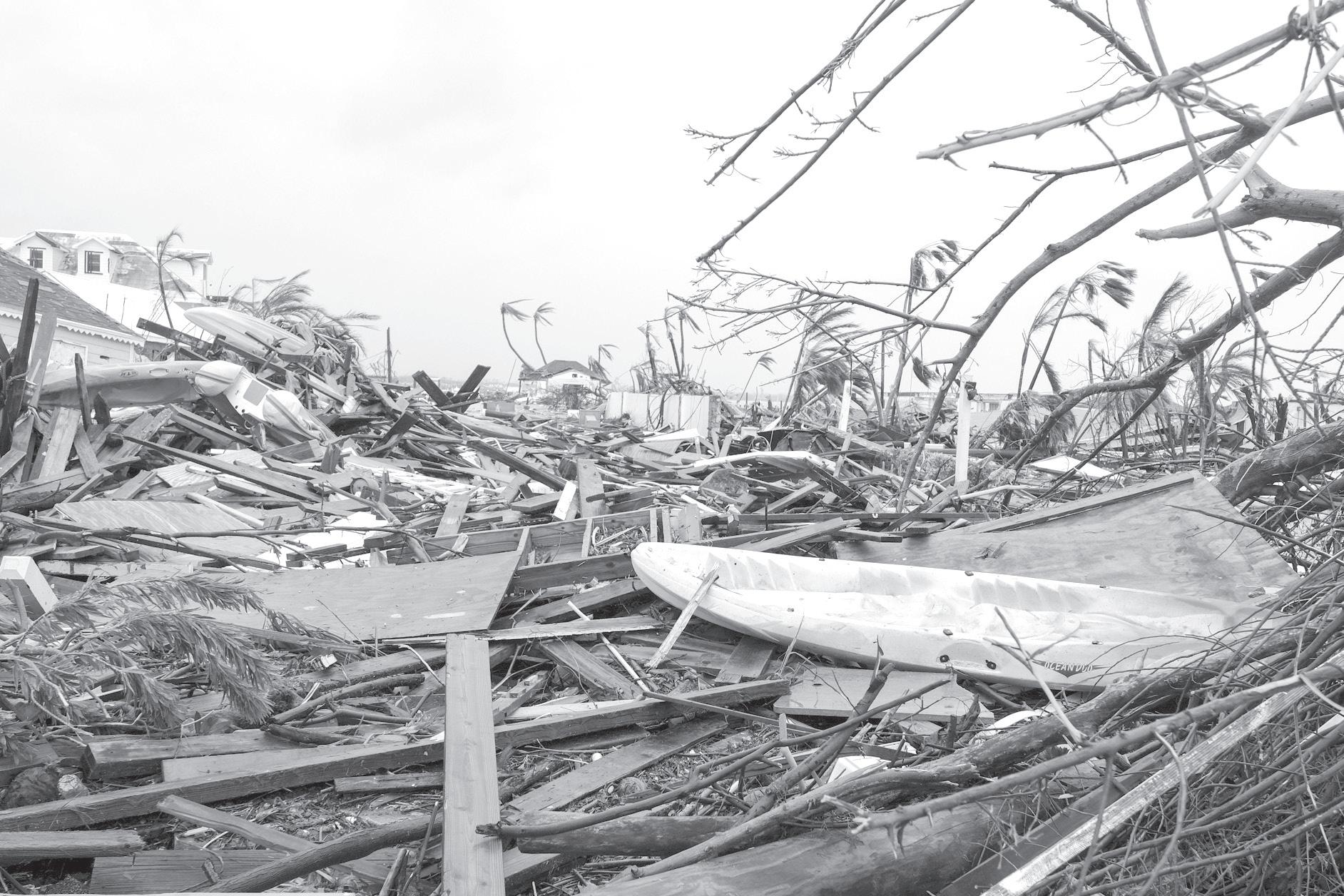
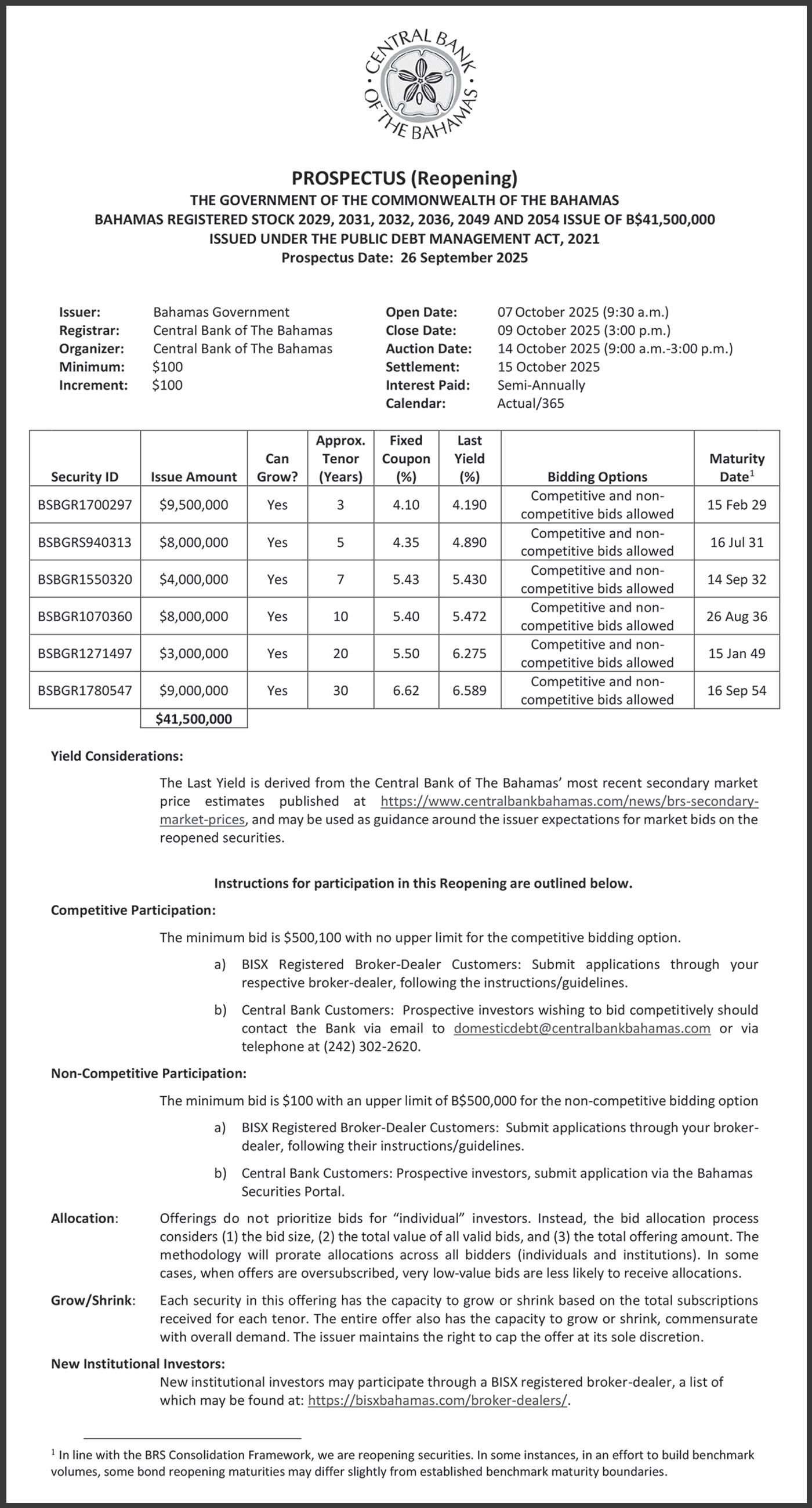
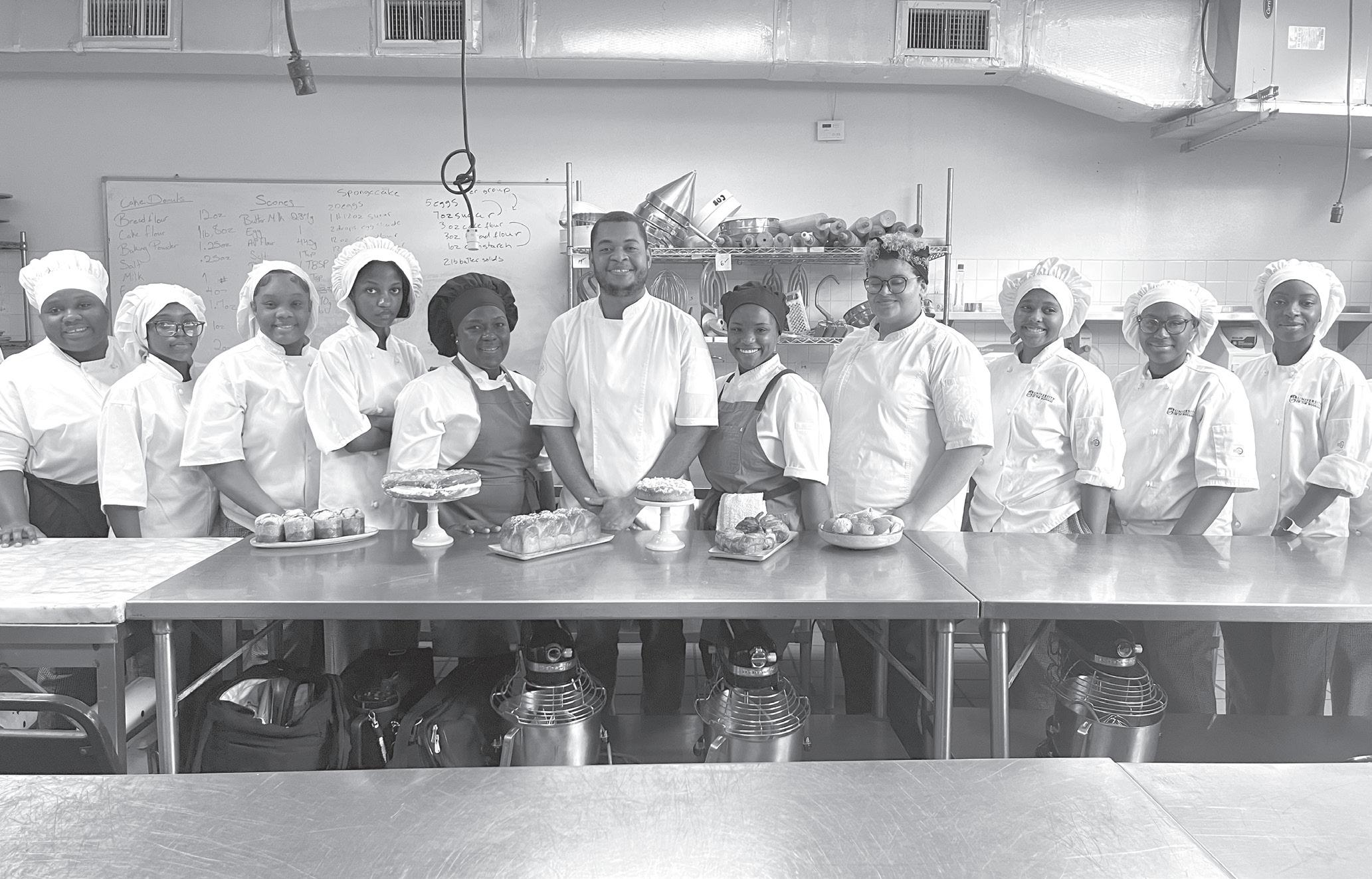
urging the government to prioritise a VAT policy review, Neil Hartnell reports Sports - the Bahamas national golf championships and defeat for The Bahamas in rugby; plus Fourth
A10INSIGHT

Failure to have both TVET and traditional academics available in all school programmes
THE sweet aroma of fresh brioche filled the kitchen as students in the advanced baking and pastry class at the University of The Bahamas College of Tourism, Hospitality, Culinary Arts and Leisure Management (THe CALM) eagerly waited to learn from an industry expert.
Returning to his alma mater, UB alumnus and pastry chef Antonio Dean led a hands-on demonstration in artisanal bread-making, sharing both technique and industry insight.
For Antonio, now a chef at Rosewood Baha Mar, the experience was “surreal”.
believed in her potential enough to invest in her. It was the boost she needed to believe in herself and pursue her own dreams.
Stephanie is convinced that college has unlocked a whole new world for her and set her on a path towards success. She has used every moment of her Associate’s programme to explore all aspects of the little-known field of medical technology.
school does not work out. Unfortunately, as a society, we place white collar jobs tional system separates the tial”, and for those students However, countries such tional system rivals most, shows that 45 per cent of students choose a technical ditional academics*. What if Joshua, who can take a car apart and put it back together, or Gabrielle, who can paint nails like artwork portunity early on to be seen as a success for who they are, as opposed to the expectations that society projects onto them? For nical vocational education and training (TVET) is
“It’s an exciting field that allows you to make sure that doctors are giving their patients the right diagnosis through testing,” she said. Stephanie knows that although there are many well-trained physicians in The Bahamas, there is a great need for equally welltrained healthcare technology professionals.
While there are still changes needed to be made in our educational system, embracing the fact that
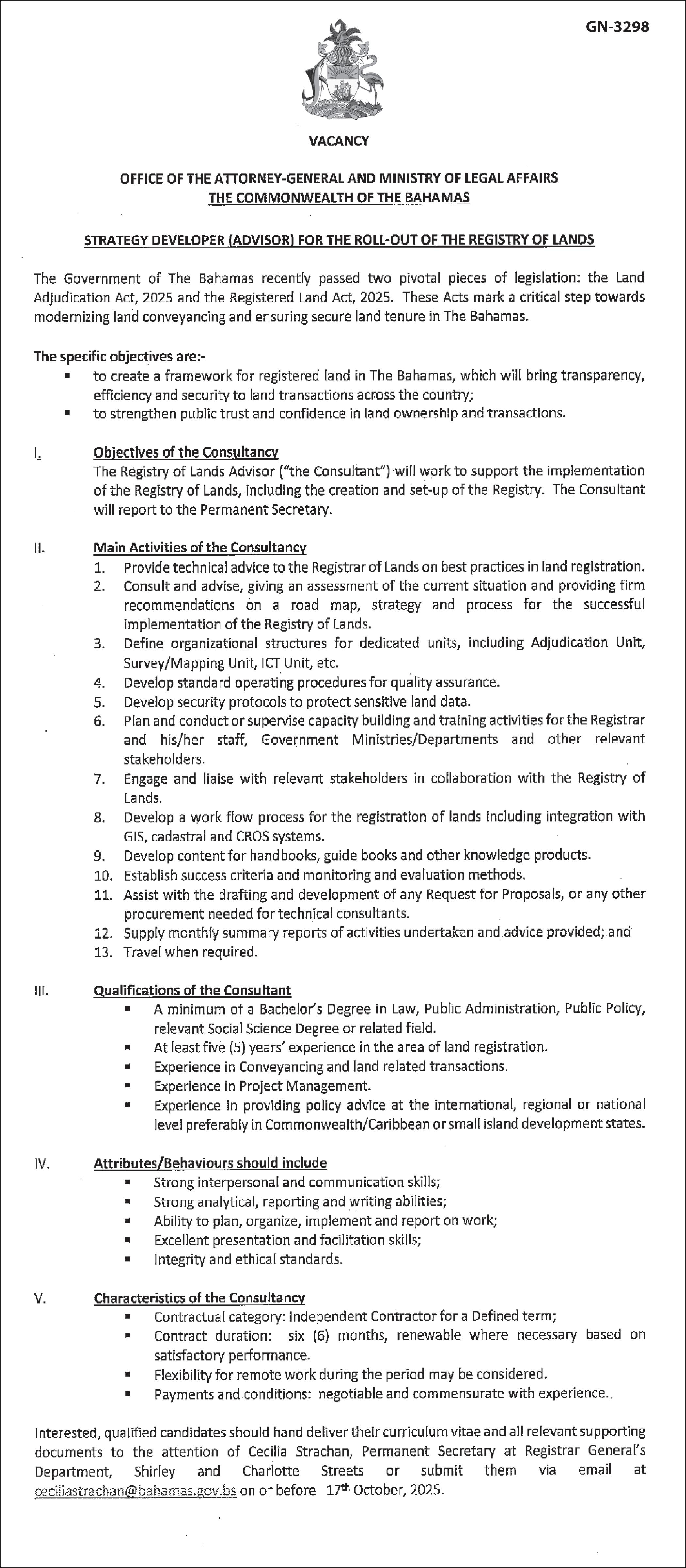
the same way that you would go in a culinary class and you would learn the five mother sauces, you could see brioche as a mother dough,” he said.
The class, taught by adjunct faculty instructor, Chef Rebekah Brice, marked a milestone for UB as the first cohort of students pursuing the Associate of Science in Pastry Arts. For her, industry partnerships like this one with Baha Mar elevate the programme.
“What I think was very important for people who’ve been here before – industry professionals – is you’ve got to prepare students for the industry,” he said. “Even how the industry is now, compared to what it was just a couple of years ago, there’s an opportunity for them to use artisanal bread-making skills… It’s just an opportunity for us to come and share information so that they could be better prepared for the industry that they’re going into.”
Bringing students face-to face with industry professionals, many of whom are UB alums climbing the ladder of success, is a priority for UB. THe CALM has, over the years, in several different iterations, been serving as a robust pipeline for talent throughout the culinary, tourism and hospitality sector.
After graduation, Stephanie plans to pursue a Bachelor’s degree in biological sciences or clinical biology. She will also do further study to become a certified specialist in hematology and microbiology. This combination of training will allow her the versatility to pursue career fields that range from pathology to public and allied health.
Stephanie’s ultimate goal is to return to The Bahamas and partner with an established laboratory company to expand its business to include more diverse medical technology services. Her hope is that her training will help the country closer provide a wider array of medical laboratory services locally without having to send the more complex laboratories abroad for testing. She also hopes to spread the word at home about the importance of this critical field. “College has allowed me the chance to really look toward the future and seek out opportunities where I couldn’t see them before,” said Stephanie. “This opportunity was the just the first rung on a very tall ladder. I plan to continue to climb and I’m going to continue my education by any means possible.”
On the work table, Chef Antonio demonstrated the versatility of brioche, and together with the students they created variations that included chocolate brioche, a German-style bean and stitch, brioche coffee cake, and even laminated brioche, similar to croissant dough.
“I love it because I was a former COB student, and back then we did not have a pastry associates [degree] programme,” she said. “It’s fabulous to see chefs from the industry coming in to share what they do, and the students being able to get that firsthand industry knowledge along with the knowledge I give them in class.”
TVET is a first option for some is an important step towards progression. The child that is talented with their hands is just as intelligent as the child who aspires to pursue medicine. Social equity begins with us, for the carpenter and the doctor both end up contributing to the society as a whole. Thus, failure to have both TVET and traditional academics available in all school programmes is truly a disservice to our children and ultimately our country. At this pivotal moment, there is no simple answer to solve our social and economic ills. Nevertheless, one of our answers lies in placing diversified education at the forefront. All countries, especially developing countries, need balanced development through all of the educational sectors in order to make significant progress in terms of national development (Bennell,1996). We must see beyond 2017 and look to 2027, when our educational system produces more than enough qualified, visionary citizens who could build a world class resort that would rival most. Implementing TVET
Dean of THe CALM Mario Adderley also emphasised how collaborations with industry partners enrich student learning.
“Typically, they would not have gotten to this extent because there’s so much content in the class, and so being exposed to it at this level broadens their knowledge and a bit of their horizon. We’re fortunate enough to be able to have these relationships with properties like Baha Mar, Atlantis, and others,” he added.
Students were equally excited about the experience.
weekly collaboration of the Lyford Cay Foundations, Bahamas Technical and Vocational Institute and University of The Bahamas aimed at promoting a national dialogue on higher education. To share your thoughts, email gainanedge@tribunemedia.net.
“I’ve always wanted to be a pastry chef,” said Pastry major Tehryn Cash. “So, when someone comes in with the knowledge that he has and shows this expertise, I was really excited.”
As UB continues to open doors for these kinds of opportunities, it was proof for Chef Antonio that giving back is just as rewarding as moving forward.
“I wanted to show them
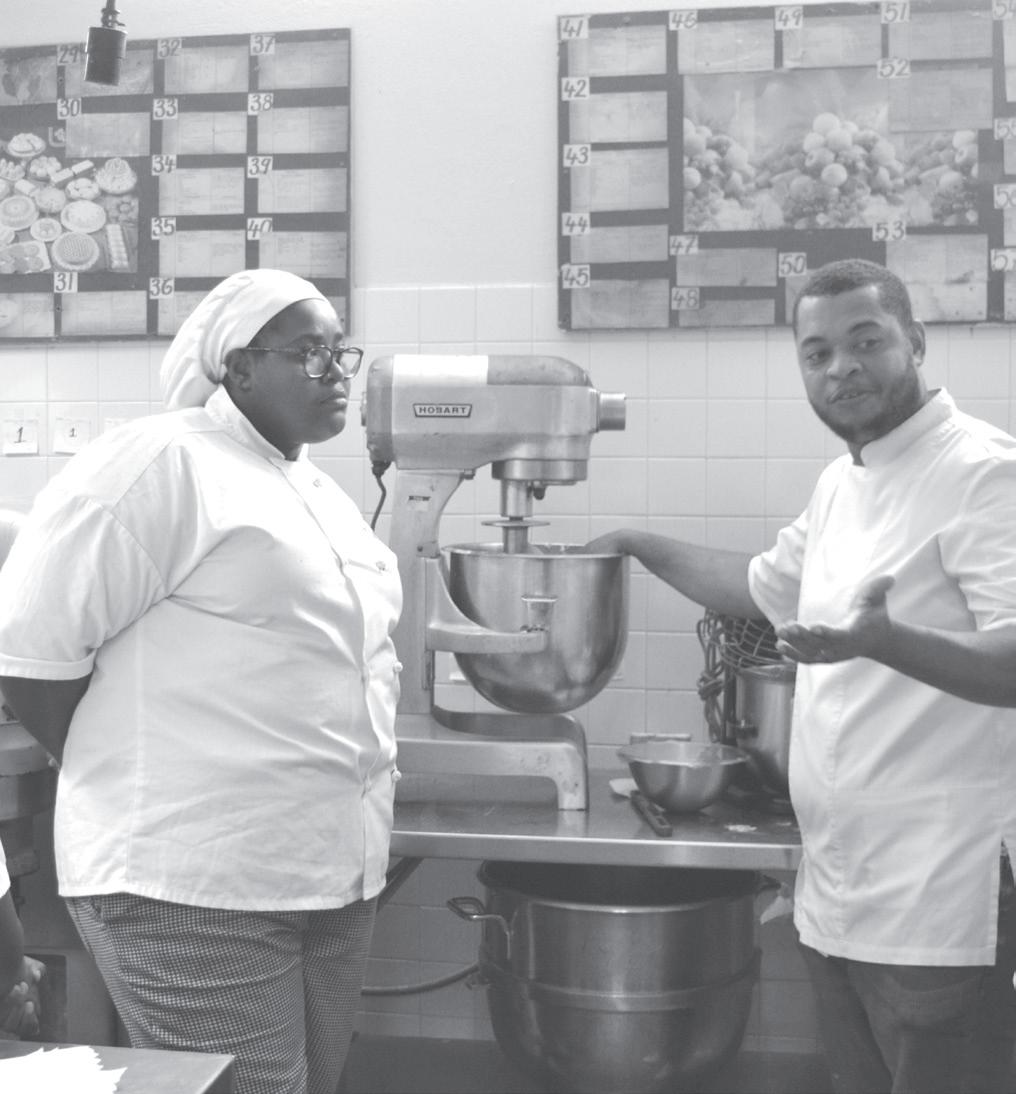
‘It’s fabulous to see chefs from the industry coming in to share what they do, and the students being able to get that firsthand industry knowledge along with the knowledge I give them in class.’
TECHNICAL vocational education help students, says
Chef Rebekah Brice
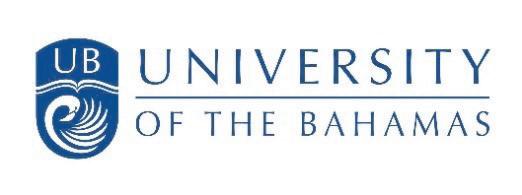
By DENISE MAYCOCK Tribune Freeport Reporter dmaycock@tribunemedia.net
RESIDENTS of East Grand Bahama were urged to evacuate over the weekend after officials issued a mandatory order for settlements in East End ahead of the approaching storm system.
By late Saturday, about ten people had arrived at Maurice Moore Primary School, the designated shelter for East End, using government-arranged transportation. More evacuees arrived on Sunday as officials pressed communities in Gambier Point, McLean’s Town, Pelican Point, Sweeting’s Cay and nearby cays to comply.
East Grand Bahama MP Kwasi Thompson visited the shelter on Saturday to check on constituents, bringing hot meals and drinks for those already settled. He also arranged refillable water tanks, provided by Rotary Clubs, to be placed at various locations to ensure residents had access to water ahead of the storm.
Administrator Preston Cooper confirmed evacuations were under way, noting that special arrangements were being made for vulnerable residents,
including a bedridden senior in McLean’s Town. He warned that the Grand Bahama Utility Company was expected to shut off water supplies in Freeport, which would affect East Grand Bahama.
“Persons who choose to remain behind will be deprived of water supplies, so it is in their best interest to cooperate,” Mr Cooper said.
He stressed that because of the evacuation order, first responders would not be deployed during the storm and would only respond once the all-clear had been issued.
Three shelters are open on Grand Bahama: Maurice Moore Primary School in East Grand Bahama, Christ the King Anglican Church in Freeport for special-needs residents, and St George’s High School gymnasium, which opened Saturday evening. In West Grand Bahama, the Eight Mile Rock gymnasium also opened.
Assistant Director of Social Services AD Burrows urged residents to bring essential items, especially medication and supplies for children, when entering shelters.
“We will do our best to meet the demands as much as we can,” she said.
“But we still require that you bring certain items to ensure your comfort and safety during your time in the shelter.”
Law enforcement officers were deployed to East E to encourage compliance. Residents were warned that those who refused to evacuate would not receive assistance until after the all-clear.
The storm is expected to bring tropical storm con ditions to Grand Bahama today, with officials stress ing the potential for rapid intensification. Celebration Key and other sister cays suspended operations from Sunday, while Maurice Moore Primary remained closed as it was being used as a shelter.
Mr Thompson again checked on constituents at Maurice Moore Primary, providing meals and con firming that water refill tanks had been distributed across the constituency.
Mr Cooper later con firmed that 108 East E residents had evacuated and were staying with family and friends in Free port, while about 30 people were housed at Maurice Moore Primary. Fourteen remained on Sweeting’s Cay. All residents have evacuated from Water Cay and Deep Water Cay.



